#i watched director’s cut first then theatrical cut second and *trust* me it’s just as open to suggestion with added thematic connections
Explore tagged Tumblr posts
Text
all the losers who think donnie darko’s theatrical cut is better than the director’s cut should never watch a movie again, actually.
#skip inxs opening the film? skip the watership down plot? cellar door? philosophy of time travel excerpts?#donnie darko#jake gyllenhaal#i had no idea people felt this way until like ten minutes ago but am already against it#someone called it bloat filler#that takes away the mystery of it#but…no????#it only does that if you’ve already seen the theatrical cut first#i watched director’s cut first then theatrical cut second and *trust* me it’s just as open to suggestion with added thematic connections#director’s cut is a masterpiece#theatrical cut is abrupt and still decent but pales in comparison to the dc
6 notes
·
View notes
Text
Film Friday: Dark City
On occasion I will come across a piece of media that would absolutely have me in its grasp if I watched it when I was younger. This isn't a value judgement on the movies as much as it is recognizing aesthetic that would be my entire shit if they got to me at a formative enough age. Today's movie is one of those, and as a bit of a mystery, I really recommend going into it blind. I also really recommend not watching the theatrical cut because it spoils the mystery in the opening minutes of the movie. If alternate cuts aren't available, as they often aren't in today's streaming market, you can correct for this by muting the movie until the screen is no longer dark. Trust me on this one. Anyway, let's get on with the movie.

John Murdoch is having a bit of a strange hangover, as he wakes up in a hotel room with a dead body and no memory of how he got himself into this situation. He has a wife, apparently, a job, and goals, he would like to escape the dreary overcast city and go to Shell Beach at one point. It is weird, he can't help but notice, how nobody seems to realize the sun never rises. Odder still is the machinations of The Strangers, a group of fellas in trench coats who run a city-wide experiment at night, shuffling around people's lives and the very geography of the city.

What unfolds is in practice a sci-fi-heavy Twilight Zone episode-type story. It is pretty fun to see how the almost-realistic if visually stylized ontological mystery peels away to the wider sci-fi thriller underneath. The movie does have answers to the questions it raises, and it is honestly one of the better examples of plots that do such a complete turn on its assumed genre.
It is also, I suspect, where the director lost the studio and promotion people. While I don't envy the job of trying to market a movie like Dark City to a late 90's cinema audience that hadn't had their minds sufficiently blown by The Matrix yet, there's no denying that New Line fucked up on this one.

It isn't just the opening of the movie, where Kiefer Sutherland's Dr. Schreber lays out the entire setup and every reveal for acts 1 and 2. Granted, as the Stranger's... let's call it unwilling collaborator, he would sit on all that knowledge... but you don't give that to the audience right away. Like what the actual fuck are you doing at that point? Why bother to HAVE a first and second act if you're just going to cliffnotes the entire thing minute one. Of course, it isn't helped that the tagline for the thing is also a real whopper of a spoiler as well.
It's easily one of the single most self-sabotaging moves in cinema history, and it's not like it'd be hard to make a compelling mystery out of it. "What lies at the heart of the Dark City," or perhaps "A man without a memory, lost in a city without light" or "jeez what's the deal with all those trench-coated cunts" or whatever. The movie is a really cleverly constructed set of mysteries, and just playing along with that a little bit could've made this movie quite iconic.

Now, this might be me going all "old man yells at cloud," but I think people forget how much the central mystery of what exactly The Matrix was. "The Matrix has you," promotional material would hint, "Free your mind." It was back in the day where you could, if you so chose, get real coy about what your movie actually was about, and if you presented a compelling mystery it could get butts in seats on that alone. I have always suspected this is what motivated the initial release of Alien in my country being titled "Den Åttende Passasjer" (lit: The Eight Passenger) was to try to build a bit of extra mystery.
All of this isn't to say that Dark City is this flawless piece of cinema. It is stylized so heavily it might come off a bit hokey to a modern audience. Some of it is in the acting, such as Kiefer Sutherland's intense unhinged brain doc, and the first few bits of Rufus Sewells protagonist feels a bit floundering and "Intro to Acting"-y. I will say that Sewell seems to hold himself admirably once there starts to be an actual plot for him to interact with, and Sutherland's semi-crazed intensity fits his role in that same plot way better than being "seemingly normal" ever did.

There is something deeply noir about this, about how the stylization of "regular" life in the city feels so alien because it is. The roles that are being played are superficial and inauthentic, and that's because they are. It's all an experiment by an alien observer, trying to suss out something or other about humanity through shuffling all the pieces around and seeing what it gets them. It is, in a way, a next level step from using stylistic sets and dialog to examine the human condition, or Science Fiction boiled down to its most basic component.
And what components indeed. We do get some of that not-always-great 90's CGI, but a lot of the movie's visuals is awesome sets and stylish lighting. Some of the sets, or so the story goes, was sold off to the production of The Matrix, and while they struck somewhat less of a striking figure in that movie, it is a neat little connection.
I feel I also must give a shoutout to the villains of this piece. We never learn too much about The Strangers and their deal, but there's enough intriguing hints and outright explanation to make them feel just real enough for the weird antagonist role they fill in the story. Mister Hand, played with a layer of subtle unhingedness even through all the Stranger business by the always kinda off Richard O'Brien, deserves particular note. Ian Richardson also gets a nod for going all out on the declarative voice as Mr. Book, the ostensible leader of the Strangers.

In a way, I wish that the movie was a little bit more cryptic about the Strangers and the strange goings on of Dark City. It is a compelling story, but some of the interactions between the Strangers and John feel like they're meant to come as more of a twist than they are. That could, of course be my storytelling dork brain that's a bit faster to pick up things than what is perhaps reasonable to expect.
It's also interesting to me that for a movie that deals with memory and identity, Dark City comes up kind of agnostic about what role memory plays in our personality. Like yes, Murdoch is driven by what fragments of his memories he possesses, but the memories that allow him to reach his full potential and ultimately defeat The Strangers are every piece as synthetic as the implanted memories he left behind. It isn't him returning to a "true" self as much as Kiefer Sutherland giving him memories of using his alien superpowers for decades as a desperate hail-mary. If this movie came out a few years later, I'd call it evocative of the Matrix, in that the fakeness of "reality" becomes a pivotal part of its unmaking

That said, the love between John and his wed-by-memory wife Emma, played by the always radiant Jennifer Connelly, seems to be real enough, and it is a quest for a more genuine existence than the dark drab pantomime that drives the plot. It does end up as a somewhat muted thing about human nature, granted, as John does come dangerously close to the old canard about Love Making Us Human. That said, I recognize that it isn't always about the destination. It is, I would say, very true to the beating heart of Sci-Fi that the movie tries to land the heady journey it has taken us to, however clumsy the attempt.

So that's Dark City for you. Strange, in the way few movies are allowed to be these days, ambitious, in the way good Sci-Fi is, gorgeous, in that consciously stylized way only movies can get. Give it a look if you happen to have ignored my advice wrt spoilers in the intro. It is, after all, only human to be curious.
8 notes
·
View notes
Text
Zack Snyder’s Justice League (2021) Review
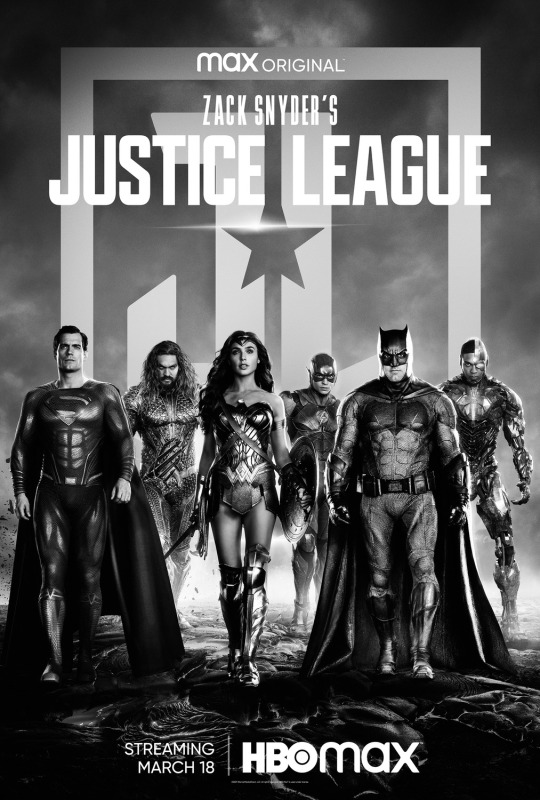
It all started with Sonic’s teeth. Ever since fans successfully bullied a studio into reanimating their titular hedgehog character after the abomination shown in the first trailer, fans realised that rallying together (on Twitter) can make a difference. So you’d think it would mean we could all come together to restore world peace and get rid of racism, injustice, poverty, war and negativity of all kind? Nope, nope it does not. But at least we get a better version of a bad DC movie that came out in 2017. I mean, baby steps I guess.
Plot: Fuelled by his restored faith in humanity and inspired by Superman's selfless act, Bruce Wayne enlists newfound ally Diana Prince to face an even greater threat. Together, Batman and Wonder Woman work quickly to recruit a team to stand against this newly awakened enemy. Despite the formation of an unprecedented league of heroes -- Batman, Wonder Woman, Aquaman, Cyborg and the Flash -- it may be too late to save the planet from an assault of catastrophic proportions.
I recall my younger simpler self in 2017 at the early age of 20 soon to be 21, sitting down and watching the new Justice League film with zero to no expectations, as by that point the DC Extended Universe was a trainwreck and was a franchise that was literally falling apart before out unblinking red hay fever filled eyes. However, after watching Justice League I was baffled at the fact that I still managed to be disappointed after having zero expectations! With zero expectations this film took me into the minuses, and we all know I’m not great at mathematics so boy are we in the danger zone when we hit the minuses! Looking back at my review of the film back then, I used extreme yet fitting comments like “generic”, “predictable” “messy” and plain “dogsh*t”. Which is what it was. 2017′s Justice League is exactly how I’d imagine a dog’s poop would look if it was turned into an abstract film! It was truly abysmal. After that I thought I’d never have to talk about this film again. How wrong I was. But, in a rare turn of tables, I am glad that I was wrong...
A little history lesson first. Alright, settle down kids, settle down.... Rob, put the paper plane down, do not throw it, I said DON’T THROW IT! NO! Stop! Stupid child!! Headteacher’s office right now! Also, say hi to your mother for me, okay? I’m having brunch with her on Saturday and you better not be there as you should be doing your homework watching the 4 hour cut of Justice League and questioning your life choices!! Anyway, now let’s have ourselves a history lesson. The topic is - What In The Flying Fudge Happened Behind-The-Scenes Of Justice League For DUMMIES: Condensed Edition. A really condensed version as honestly none of us have the attention span to read loads and I’m probably losing the vast majority of you due to this overlong rambling session. So anyway, to the last couple of readers left, here we go! Following the success of Man of Steel, Warner Bros. gave Zack Snyder the reigns to oversee and create a DC cinematic universe to rival the success of Marvel. And so came Batman V Superman: Dawn of Justice, which turned out to be a bit of a hodgepodge, receiving mixed to negative reviews and though was a box office success, earned diminishing results to what Warner Bros. originally anticipated. However, by the time Batman V Superman released, Zack Snyder was already hard at work on the big superhero team up film Justice League (which was meant to set up many characters and future films for the DCEU) with a lot of filming already underway, so Warner Bros. couldn’t particularly pump the breaks on it by that point, even though they evidently lost trust in the Snyder formula. To be honest, at that point I too lost trust in Snyder’s vision and the DCEU as a whole, but my opinion doesn’t class for a single dime, whilst the opinions of Warner Bros. executives make millions, so there aren’t any hard feelings on my behalf for them not enquiring on my thoughts. Anyway, midway through production Zack Snyder was hit with a family tragedy with his daughter committing suicide, so Snyder naturally had to depart the project to be with his family during this grieving time. Warner Bros. had the option to pause production and await for Snyder’s return, or progress at their own accord. Naturally they decided to do their own thing cause they are a business and want that dollar dollar bill baby!! So they hired Joss Whedon who was riding fresh off the success of two Avengers movies and obviously had experience in cinematic universes and such, to rework the Justice League movie by condensing it into a 2 hour film (from the over 4 hour material that Snyder shot) and reshoot scenes to fit the smaller runtime. So you cannot particularly blame Whedon for taking out so many great scenes as he had a contract to fulfil with Warner Bros, but then you look at the many forced jokes and unnecessary reshot scenes and you realise how self-indulgent Joss Whedon was during filming, as he basically was spitting on everything Snyder did and was trying to do his own thing. Low and behold, the mess that is the 2017 movie is created, where its the visions and creative minds of two director with evidently different styles clashing and not really mixing well at all, and as such we have a messy movie that doesn’t really make sense and is a bit of a middle finger to DC fans and honestly everyone and all. Also, there was that little aspect of Henry Cavill’s deformed upper lip due to the fact that during reshoots he had a moustache that he’d grown and was contractually obligated to have for his Mission Impossible role, so the visual effects team had to digitally remove it in post production and the result is, well, see for yourself...
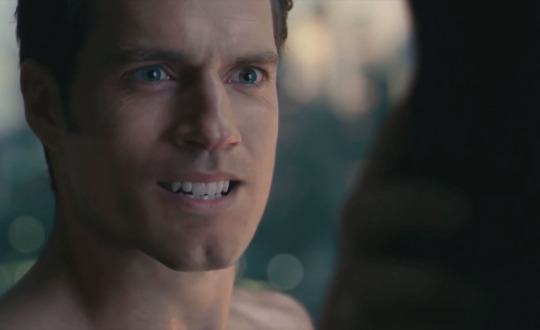
Yes, they made the dashing handsome my-sexuality-questioning Henry Cavill look stupid, and that is UNFORGIVABLE. Funny, yes, very funny but unforgivable!! So for this and many other reasons the 2017 film turned out horribly. Then after that many months later, Zack Snyder and cast and crew members began teasing of this mythical version of the movie that was befit of Snyder’s original vision. You see, apparently before he left the project, Snyder actually filmed everything he wanted and it was only awaiting to be reworked with visual effects and edited properly, but then Whedon came in with his scissors and cut everything mercilessly with a cheeky grin and his ginger beard. Speaking of his ginger beard, is Joss Whedon Irish? Or has Irish roots? Honestly, I would Google it, but wait, I don’t think I really care. So anyway, Snyder still had all of his filmed scenes saved on his ridiculously oversized hard drive just waiting to be looked at again. This is where the fandom did its magic by creating a Twitter hashtag #ReleaseTheSnyderCut and began spam posting for Warner Bros. to let Zack Snyder release what he originally intended to. Honestly, who would have thunk it, but this actually worked!! Warner Bros. allowed this, and not only that, but gave Snyder an additional $70 million to finish up the visual effects as well as to film a couple of additional sequences and gave it the prestigious honour to debut it on HBO Max, so as to boost the subscriber rating on Warner Bros. new streaming service. And here we are.
Honestly, I thought seeing this Director’s Cut of sorts wouldn’t bring much to the table as I didn’t believe that a film that was so broken had originally been in any way good. After finishing this 4 hour Snyder vision I must admit though that I was pleasantly surprised. Completely baffled by the studio and Joss Whedon, but really happy for Zack Snyder. The guy was fighting for it and finally was able to accomplish and bring out his true original vision, and though Zack Snyder’s Justice League has its flaws, its so much better than what we got in 2017, and in fact is a soaring science fiction sci-fi epic that literally feels epic!! It takes time establishing the characters and every single plot point as well as building out this rich mythology of this world of the DC Extended Universe, and so as you move into the second half of the film, there’s a feeling of pay off. You actually care about the characters and understand the plot points and it doesn’t feel rushed. Its truly astounding that there are producers out there who thought it was a good idea to get rid of all of that and instead bring out whatever the heck Joss Whedon did with the 2017 version. Look, I quite enjoy Joss Whedon’s work, from Buffy the Vampire Slayer and Angel to Cabin in the Woods and his work on Marvel, the guy obviously has a talent, but also he obviously does not belong to the dark and brooding style of DC. Zack Snyder on the other hand, though makes his mistakes, truly embraces the epic feel of the DC material. And it seems once you give Snyder enough time and space, he can actually bring out something like this:

The main characters are all given so much more to do, or at least those that got side-lined in the 2017 version are given more to do here. One of my complaints with the original was how pointless the League turns out to be. Basically in the theatrical version the main team all end up being useless and only once Superman shows up he saves everyone’s asses and literally does EVERYTHING. Might as well have called the film Man of Steel 2 (feat. Justice League). However in this new version, every main character serves a purpose. Well most of them do at least. Cyborg and Flash are much more compelling characters with more layers and backstory, and in fact are a prime reason to defeating the great evil in the end. You now understand why Cyborg actor Ray Fisher was pissed at Joss Whedon, as the guy literally got rid of his best stuff. Superman strikes a cool black suit and is still powerful, however as the finale shows, he isn’t all-powerful and does need the help of the rest of the team. Wonder Woman gets a lot more to do in this theatrical cut, and in fact this is probably Gal Gadot’s best performance as Wonder Woman and she really shows herself as a powerful female superhero! Aquaman’s role stays largely unchanged, however to be honest Jason Momoa’s character was one of the only ones who didn’t suffer in the theatrical cut. That’s unsurprising seeing as Jason Momoa is such a naturally cool dude! A big panda that is friendly in real life, but when necessary can turn into a roaring bear. To be honest, the only League member that ends up a bit pointless is actually Batman. He still serves a purpose in the film in that he’s the one who assembles the team, but otherwise the rest of the group is so overpowered compared to him that in the end you do kind of think that he doesn’t really belong there. Still, Ben Affleck is great in the role and it’s a shame we won’t see much of him past Flashpoint film that will be released in the next few years.
There are a lot of characters in this film and one can still say the movie is overstuffed, but also seeing as the movie was originally intended to spring board the DCEU properly, all these teases are actually welcome. There are an abundance of cameos, and to be honest so many characters are so well cast that you do end up wishing that Snyder was given the opportunity to make his entire Justice League planned trilogy, but nevertheless at least we have this. There are truly an abundance of cool appearances here, from the menacing villain Darkseid (played by Ray Porter) to Willem Dafoe doing what Dafoe does best, only in this case underwater and I’m certain that’s gonna span many comparison memes with The Lighthouse. Joe Morton as Cyborg’s dad is given a lot more to do here and in fact is pivotal towards building up Cyborg into the important character that he is. There’s also a cameo from Jared Leto’s Joker, who in some ways redeems himself after his appearance in Suicide Squad. Also, we need to talk about Steppenwolf, who’s the main baddie in this film. In the theatrical cut the guy was the most generic one-note villain who also looked like a PS2 character. It was honestly embarrassing the way he was animated. Luckily in this version he’s been put through enough Skyrim mods to looks much more intimidating and is also given a better motivation. As we find out, the reason he does what he does is because he wants to go home. He’s been banished and he simply wants to earn his place back home, so it’s actually kind of sweet. Steppenwolf is a sweetie. I mean, yeah, he wants to destroy half of the world to fulfil his dream, but hey, haven’t we all taken something extreme measures to get what we want?
The film is far from perfect though. At the end of the day, the movie is just about a guy hunting down a bunch of magical boxes. That was the premise of the theatrical cut and its the same here too. Yes, there is more substance and gravitas to the proceedings, but at the end of the day the story doesn’t really surprise much. And with the entire thing running at 4 hours, it is definitely too long and there is the element where there is simply too much in this thing. Also visually, though the movie has plenty of gorgeous shots and Zack Snyder’s signature slow motion sequences are on full display here, there are still many sequences where the CGI and green screen are super obvious and look really fake. That being said there’s still so much visual goodness in this, and also I have to mention Junkie XL’s new music score that does reiterate the epic feel of this movie, in comparison to Danny Elfman’s weak uninspiring notes in the theatrical cut.
Zack Snyder’s Justice League is a massive surprise and completely changes the perception of what we saw in the original 2017 theatrical cut. It’s a sprawling massive adventure that’s a dream come true for any comic book fan. It shows how vital film editing is, and how important it is to have a cohesive plan when making a movie. Gone too are the silly forced jokes, and though there is still some humour here, it feels more grounded and fit of the setting and scenario. This is Snyder’s vision through and through, and though at times it is clunky, it overall is incredible to behold, as it’s this one guy’s mind and his love for the DC lore. It’s a credible achievement, and I’m actually sentimentally happy for Snyder that he finally managed to complete this. He even during the credits dedicates this to his daughter Autumn that passed away, and I found that to be truly bittersweet. Justice has indeed been served.
Overall score: 7/10
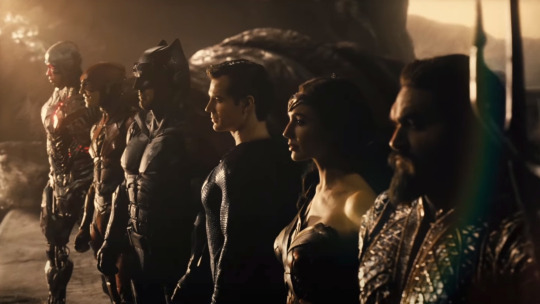
#zack snyder's justice league#restore the snyderverse#release the snyder cut#zack snyder#joss whedon#justice league#dc comics#warner bros#hbo max#zack snyder's justice league review#justice league review#superhero#ben affleck#henry cavill#jason momoa#ezra miller#gal gadot#amy adams#ray porter#ciaran hinds#jeremy irons#2021#2021 in film#2021 films#movie#film#movie reviews#film reviews#batman#superman
31 notes
·
View notes
Text
Top 10 films of 2019
Here’s my very belated top 10 films of 2019! Note that this is a list of films that were released in the UK theatrically in 2019, meaning it includes certain releases that would be considered to belong to 2018 by others.
Honourable mentions: Joker, Hustlers, Booksmart, A Private War, Fighting With My Family
(And don’t worry - Little Women, 1917 and Uncut Gems are all already on my list for 2020.)
Look out for my most anticipated films of 2020 list, coming soon!
With that out of the way, here’s my list (in ascending order)! Do share your picks in the comments!
10. The Irishman (dir. Martin Scorsese)

This is clearly the work of a master filmmaker with much on his mind. In telling the story of Frank Sheeran, Scorsese is telling the story of a man who makes his trade in violence. Instead of elevating Frank as a hero or a figure of glamour, he’s consistently shown to be rather pathetic. He stumbles into the role of hitman for various factions of the criminal underworld, and sticks to it seemingly because it’s what comes most easily to him. The violence enacted by Sheeran is inane and routine, with no thought given to the personal cost until it is far too late. The final 15 minutes of this film show a life petering out with a whimper, laying bare the indignities of old age and the cold, empty horror of enduring it with no company besides your own regrets. The Irishman is a portrait of a life lived badly, and in the hands of anyone besides Scorsese it could have been dry and tedious. Instead, the filmmaking is incredibly assured and the editing is whip-sharp (in Thelma Schoonmaker we trust), making it a pleasure to watch even with the lengthy runtime.
9. The Farewell (dir. Lulu Wang)
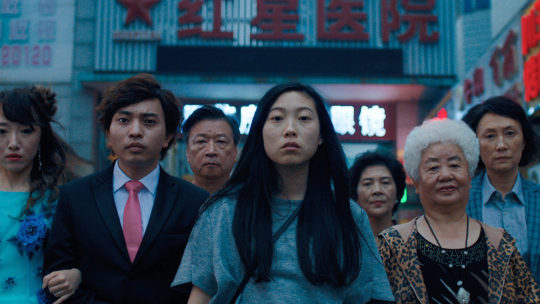
The Farewell is a personal story about a young Asian-American woman (Awkwafina) struggling to reconcile her heritage with her current situation and values - specifically, she is tested when her grandmother is diagnosed with cancer and the wider family make the decision to hide the truth from her. The Farewell does a fantastic job of generating empathy for all the different perspectives and positions in play, but it’s truly anchored by Awkwafina’s amazingly nuanced and tender performance - basically, anyone who’s ever loved a grandparent should leave this feeling incredibly moved and inspired. The themes of The Farewell are both specific to the Asian-American experience and general to anyone who has struggled with maintaining bonds over a vast distance, whether physical or cultural. Lulu Wang is an exciting new voice in cinema, and I will watch her career with great interest.
8. Pain & Glory (dir. Pedro Almodóvar)

Almodóvar is one of my favourite filmmakers, and one of the reasons I love his work so much is its wild diversity. My favourite from him is The Skin I Live In, a film that could not be more different than Pain & Glory. This is a small, very personal film telling the story of a middle-aged director (Banderas, clearly playing a version of Almodóvar himself) who’s struggling with his legacy as a filmmaker and the increasing privations attached to middle age. Suffering in the present, Salvador finds himself retreating into memories of his childhood - particularly of his mother (Penelope Cruz) and his first crush. The childhood sequences were where the film really sung for me, perfectly capturing the sun-dappled glow of reminiscences of childhood. And the ending, where Almodóvar truly shows his hand, is delightfully mischievous and the perfect cap on this very personal picture.
7. Once Upon a Time in ... Hollywood (dir. Quentin Tarantino)

This is a slice of life movie, but while that might call to mind ‘kitchen sink’ dramas, this is unabashedly a ‘slice of life’ movie about Hollywood and the mythology that has developed around it. It’s meandering and feels rather aimless for the bulk of its runtime, but that’s kind of the point. It’s exactly what the title promises in that it recaptures what life was like in a very specific time and in a very specific place - it’s an idealised, loving depiction of the Hollywood of the time, with the movie stars, flawed and fading as they are, cast as heroes menaced by the drugged-up hippies poised to dismantle the status quo. It ends in the fashion you’d expect from Tarantino, but here I found his revisionist approach to history remarkably poignant and effective. Film is a magic medium, with Hollywood serving as the ultimate dream factory - it feels completely right that Tarantino would attempt to use celluloid to right one of the great tragedies of Hollywood history.
6. One Cut of the Dead (dir. Shinichirou Ueda)
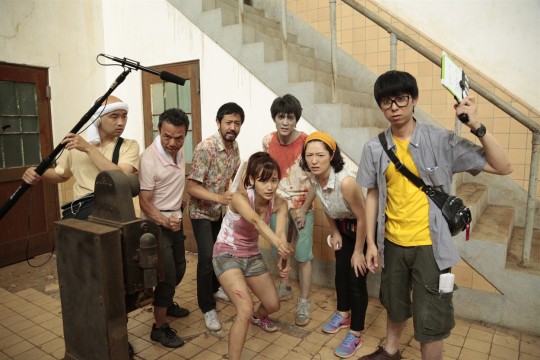
I went into this with no expectations whatsoever - and what a treat it was! One Cut of the Dead is easily one of the funniest movies I’ve seen in years, taking what initially seems like a trite concept (a crew is filming a zombie movie at a desolate location ... only to discover that the zombies are real!) and twisting it in a truly ingenious way. The comedy is very broad, but it is consistently delightful and always manages to avoid becoming crass - the movie even has some really sweet family dynamics at the centre of it, which gives it some real emotional heft. The success of this film is heavily reliant on a major twist that occurs part-way through, so the best advice I can give you is to stay as far away from spoilers for this one as possible - go in blind, and you will be amply rewarded for your faith.
5. Midsommar (dir. Ari Aster)
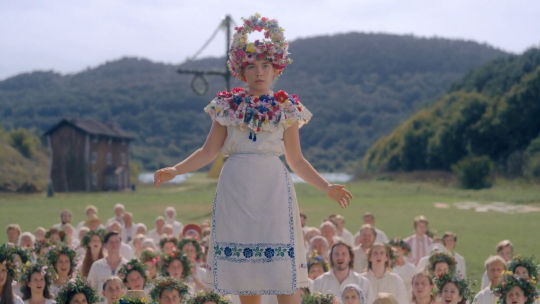
I went into this film with reservations, since I wasn’t a huge fan of Hereditary (by the same director), which I found to have extraordinary moments but iffy execution overall. This movie, however, wowed me. While marketed as a freaky/arty horror film, the director has described it as a fairy tale, which is the level on which is spoke to me. Midsommar follows Dani (an incredible Florence Pugh), a young woman who has suffered a terrible loss, as she travels with her boyfriend and his friends to a pagan festival in the Swedish countryside. Dani is painfully isolated, and her grief is hers to shoulder alone since her boyfriend is un-receptive and entirely unprepared to help her. Over the course of the film, destruction and creation are conflated in ways that are both beautiful and horrific - this film spoke to me on a profound level, and the way it ended gave me an incredible sense of catharsis. This won’t be for everyone, for I found it to be a deeply special film. Let’s all raise a toast to the imminent, and much welcome, reign of Florence Pugh.
4. Parasite (dir. Bong Joon-Ho)

Parasite is that rare film that more than lives up to the massive hype surrounding it (you don’t get more hyped than winning Best Picture at the Academy Awards!). It’s hard to write about this film without spoilers, since so much of the joy of Parasite lies in discovering what the hell is going on. This is an ‘upstairs downstairs’ movie for the 21st century, where the downstairs people have fierce designs on the lives and pleasures enjoyed by their social superiors. The rich people here are not vilified, though they are depicted as vapid and shallow, perpetually searching for new ways to fill their lives with meaning. Their struggling counterparts from the rough side of the city are struggling only to get by - their lives too hard to allow time for such indulgences. This is a film about the fantasy of social advancement, and the power that dreams have to hold us in thrall to hopeless ambitions. It’s masterfully directed, acted and designed, and it has been extremely gratifying to see it receive such widespread recognition.
3. Marriage Story (dir. Noah Baumbach)

I was always going to see this (hey Adam Driver!) but I was entirely unprepared for how great Marriage Story was. Easily Baumbach’s best film, Marriage Story is a masterclass in acting and character writing - it’s fiercely intelligent in how it constantly forces you to reassess what you’re seeing and where your sympathies lie. Does Charlie seem like an oblivious, navel-gazing asshole? Sure, but he’s also confused and vulnerable and thrown entirely off balance by his awakening consciousness of his wife’s dreams and ambitions. Nicole is self-effacing and self-denying, as so many women are, which makes her emerging confidence and newfound sense of direction incredibly satisfying to witness. In the second half of Marriage Story, Driver’s Charlie undoubtedly takes the spotlight - it’s clear to me that he becomes the focus largely because he continues to flounder as Nicole finds her footing. Baumbach, wisely I feel, is most interested in his characters when they’re lost, struggling to be better but barely understanding what that means. Even if you don’t sympathise with Charlie by the end of Marriage Story, I can promise you will come away with a thorough understanding of him thanks to Driver’s extraordinary performance. Superlative work, all round. (It’s also, just for the record, the only film of 2019 to make me cry.)
2. Portrait of a Lady on Fire (dir. Céline Sciamma)

This is the 2019 film I am most excited to see again (it’s coming out in a week in the UK - I’m so excited!). Sciamma’s film is an incredibly moving and deeply beautiful love story, depicting how a female artist in 18th century France falls in love with the woman she has been covertly employed to paint. Portrait is very much a film about the act of looking, and in many ways it’s the ultimate female gaze film - it’s all about women looking at women, as depicted by a female filmmaker. Gazes are political as much as they’re romantic - here, our two heroines drink each other, aware of exactly how dangerous and forbidden their mutual intoxication is. The woozy thrall of their relationship is exquisitely conveyed through the cinematography and direction, and the final shot - which I won’t spoil - is an all-timer that serves as an exquisite coda to the entire film. This is a truly superb film, and I’m still incensed that it received no substantial awards recognition. Let’s hope it goes down in film history as the masterpiece it is, yet another omission proving the limitations of the Oscars as a metric for great art.
1. The Favourite (dir. Yorgos Lanthimos)
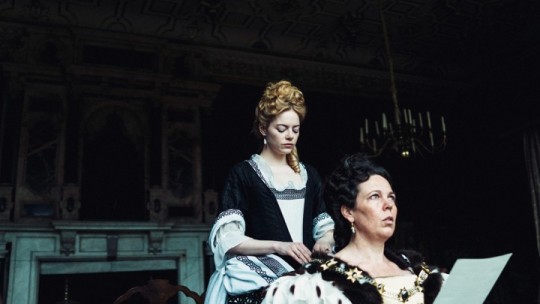
This completely wowed me, and against all the odds it stuck with me as the best film I saw in 2019 - it features a trio of magnificently compelling female characters (played by Olivia Colman, Rachel Weisz and Emma Stone) operating at the court of Queen Anne (Colman is Anne, Weisz and Stone are courtiers), and is laser-focused on the shifting sands of the power dynamics between them. The script is savage without sacrificing poignancy, witty without ceasing to be emotionally honest. And while I’ve seen some react to this film as a comedy (and it certainly has laughs, most of which are tightly packaged with shock), for me it was very clearly a drama about the inscrutable and complicated relationships that exist between women. Specifically, it is about how those relationships run the gamut from sincere affinity to ruthless manipulation. This is a spectacular movie, visually and thematically rich in every frame, and it also has the best use of an Elton John song in 2019 (sorry, Rocketman!).
Fly away, skyline pigeon fly, towards the things you’ve left so very, so very far, behind.
#the irishman#portrait of a lady on fire#the favourite#midsommar#adam driver#marriage story#florence pugh#the farewell#awkwafina#parasite#once upon a time in hollywood#film#cinema#best of the year#2019#one cut of the dead#pain and glory
315 notes
·
View notes
Text
A Chip on My Shoulder (Crystal x Gigi) - Frankenvenus
Summary: After deciding that a childcare career just wasn’t for her, Crystal auditions for a theatre company who are putting on a production of Legally Blonde, and ends up falling for their lead, who happens to turn her nose up at everyone who shows any interest in her - however, she might have a soft spot for the new girl.
…
Crystal had been waiting all summer to find out whether or not she had been accepted into L.A’s prestigious theatre programme ‘Rupaul’s Academy of Performing Arts.’ Her audition had been in late May of 2019, and it had gone seemingly well. She sang the first minute of ‘A Boy Like That’ from West Side Story, as suggested by her mother, though she actually wanted to sing a song from Anastasia. Her mother had told her that Anastasia was far too babyish, and it would only be appropriate if she was auditioning for a role as a princess at Disneyland. She did what her mom said, and successfully hit each note in the audition room. The theatre director watching her seemed pleased. She was optimistic that she would land a place in the company.
She had been studying a college degree in childcare after leaving high school, but she quickly realised that she fucking hated it, she fucking hated little kids, and she really wanted to pursue musical theatre. Her family was overjoyed, to say the least. Her dad had had this ridiculous fantasy that they would become a family band and Crystal would be the next Selena Quintanilla, so he was very supportive of his daughter’s change in aspiration.
The letter arrived on the 1st of September, and Crystal’s mom snatched it out of her daughter’s hands before she could open it. The woman was insistent in finding out first.
She dragged her sharp nails across the top of the envelope, opening it in the most inefficient way possible. She had a large smile across her face, simply knowing that her daughter was going to be accepted.
“Mom could I-” Crystal tried to take the letter into her own hands but her mom slapped her fingers away.
“Basta ya, I can do it myself,” she sighed, yanking the letter from the envelope and unfolding it, “Dear Crystal Elizabeth,” she sang, her voice filled with hope, “We regret to inform you that you have been unsuccessful in the selection of this year’s cast…” her mom quickly slammed the letter against the table and left the room leaving Crystal alone to finish reading it through watery eyes.
“We were overwhelmed with this year’s talent and wholeheartedly suggest you try again next year. We urge you not to give up on your theatrical dream as there are always other opportunities- this is the letter they send to everyone who failed, why am I reading this?” she sniffled, pushing it down on the table as her mom walked back in.
“It’s that blue hair of yours, Crystal, I know it. Maybe if you had kept it brown then they would’ve accepted you.”
“Si mamá,” she sighed, wiping her eyes and picking up her phone which was face-down on the table in front.
In that next moment, she thanked the gods and Mark Zuckerberg for listening in to her conversations, because an advert notification popped up on her screen when she opened Instagram.
Stephanie’s Child School of Theatrical Arts - Walk-in auditions September 8th - Anyone is welcome - Headshots NOT obligatory - Bring your own sheet music!
Crystal kissed her phone and rushed to her laptop, printing out the sheet music to ‘Journey to the Past’ from Anastasia as discreetly as she could. This other theatre school was no Rupaul’s academy, evidently (their advert used comic sans in the title) but she still felt like it was a sign.
After many nights of rehearsing, practice and being told to shut the fuck up by her little brother, audition day finally came.
She was given a sticker with her name on it upon entry, as well as a number. The school’s studio, where the audition was taking place, seemed quite old and in need of a makeover, but it was homely nonetheless. There were only about ten other people auditioning, unlike Rupaul’s school with over a hundred auditionees. Crystal wondered how many people attending were Rupaul rejects, and it made her uneasy.
After warming up alone by blowing bubbles into her water with a straw for ten minutes, a gleeful looking girl bounced in with lilac-coloured hair.
Thank God - this meant Crystal’s blue hair wouldn’t be an issue when being accepted.
“Hey, people! My name is Jan and I am the theatre director here. So we are going to start with number twelve for singing and then work our way down, and then you’re going to learn some choreo for a dance call!” she beamed, gripping her clipboard aggressively.
A dance call? Have mercy.
Crystal was number eight, which meant that it wouldn’t be long before she was called in to sing. She bounced her leg tensely, watching one girl begin to stretch in the corner of the room. Her name tag read ‘Jaida,’ and she had come in a leotard and jazz shoes - more prepared than Crystal.
After a minute of staring, Jaida caught her, before smiling and approaching her.
“Hey, girl! You threatened?” the girl asked sternly, causing Crystal’s heart to drop. Oh no, she had already made a bad impression.
“I- no… sorry I-” she was cut off with a laugh from the tall brunette in front of her.
“I’m just fuckin’ with you. Hi, I’m Jaida. And you are…” her eyes trailed to the shorter girl’s name tag, “Crystal. Cute. What are you singing?”
“Journey to the Past from Anastasia,” Crystal spoke nervously, fumbling with the pages of her sheet music.
“Awe, bless you,” Jaida chuckled, placing a hand over her heart, “I’m singing Aquarius from Hair. Also don’t look so nervous, sweetie. My friends Heidi and Jackie go here, and they say it’s super chill. Plus - you look talented.”
Crystal blushed, “Thank you. So do you!”
Jan walked back into the room with her clipboard in hand, “Can number ten follow me please?”
Jaida’s breath hitched as she shuffled across the room to grab her sheet music. She quickly winked at Crystal before disappearing into the other room. The blue-haired girl could hear the large rumble of the grand piano, but was disappointed that she couldn’t hear Jaida’s voice. The girl seemed enticing.
It wasn’t long before Crystal was being called through. She smiled shyly while she placed her music down in front of the pianist, who was a cheerful-looking girl with heavy makeup on and large glasses. Her name tag read ‘Rock,’ and Crystal whispered a small thank you to her before taking her spot in front of Jan and another woman, who was taking notes.
“Hello, my name is Crystal Elizabeth and I will be singing ‘Journey to the Past’ from Anastasia,” she began, suddenly regaining her confidence as the soft piano began. She was Crystal Elizabeth, high school salutatorian and a killer mezzo-soprano. She belted the song with a passion she had never felt before, and she left everyone else in the room blown away after the final note.
“That’s some voice you have there, Miss Elizabeth,” Jan smiled, clapping softly, “You are very talented.”
“Thank you so much.”
Much to Crystal’s surprise, the dance call went well. She managed to pick up Jan’s choreography easily, and Jaida assisted her with the few moves she couldn’t quite get.
She left the audition that night with the biggest smile she had sported in a while.
…
Unlike Rupaul’s Academy of Performing Arts, the letter from Stephanie’s Child came quickly. It arrived in the mail less than a month after Crystal’s audition. Her mom wasn’t so eager to be first to open it after last time, so Crystal took the duty of prying open the envelope.
“Crystal Elizabeth, We at Stephanie’s Child School of Theatrical Arts are delighted to inform you that you will be joining this year’s cast and programme. We loved your audition and we would love to hear even more from you, so we can’t wait to see you in rehearsals for our winter production of Legally Blonde starting this Wednesday, and we’d love to see you audition for a role!” Crystal read it out shakily, fireworks exploding in her chest.
First of all, she got in! She was so thankful and even more thrilled that she was finally able to make her mom proud. Second of all, they were doing Legally Blonde which was beyond iconic.
…
It was the first day of rehearsals, and Crystal was almost more nervous than she was for her initial audition. She caked her face in makeup and put her hair into two low pigtails, hoping to impress her fellow castmates.
She was told by the receptionist to sign her name in at the door, so she doodled ‘Crystal Elizabeth’ with a heart on the ‘i’ before smiling at the sight of the name ‘Jaida Hall’ above her own. It was great that she had a familiar face going in.
When she entered the studio, she felt all eyes on her. It was a large dance studio with mirrors on two sides of the room, a grand piano in one corner, and tap dancing mats stacked up in another.
There were about four prominent friend groups across the room, but Crystal drifted over to Jaida, where she stood with a short girl with black hair and a large gap tooth and a taller girl with a hijab and high dancing heels on.
“Crystal! You got in!” Jaida squealed, pulling the blue-haired girl into an unexpected hug.
“Yeah, I’m really surprised. Everyone here looks so professional!” Crystal giggled, her voice cracking slightly under the pressure.
“Trust and believe - we are far from professional,” the girl with the gap snorted, “I’m Heidi! It’s great to meet you.”
“And I’m Jackie,” the girl with the hijab greeted, “Jaida was telling us how good your singing audition was.”
Crystal’s eyes widened as she looked to the brunette, “You could hear me?”
“I may or may not have stood by the door. You have pipes, girl.”
“So you have a high belt, hm?” Heidi asked with a glint in her eye.
“Yeah, I guess so…”
“Well, you’re gonna have to compete with Gigi for the part of Elle then…” Jackie smirked, pointing across the room.
Crystal averted her gaze to where the girl pointed, and suddenly she felt abruptly light-headed.
There stood a remarkably tall redhead with perfectly curled hair tossed over one shoulder, warming up into a belt box that she held to her mouth, as many surrounding girls watched, mesmerized.
“I just know she’s that girl,” Jaida rolled her eyes, “Let me guess - she auditioned with ’Don’t Rain on My Parade.’”
Heidi nearly spat out the water she was drinking, knowing that Jaida had hit the nail on the head.
“She has a three-octave belting range. She’s scary,” Jackie exhaled, patting Heidi’s back gently to stop her from choking.
“She’s hot,” Crystal thought, still watching the girl warm up. Gigi. That was like a model’s name. She wondered what it was short for. Georgia, Regina, Imogen, Virginia, Genevieve, Gianna - It could be anything.
“You’re right, she is hot alright,” Heidi said, causing Crystal’s stomach to plummet because she said that out loud, “But she barely lets anyone touch her. She’s nice and all but - we barely know anything about her - other than her insane range. Her mom is a vocal coach.”
The blue-haired girl frowned. Even though she was still yet to talk to this girl, she wanted to know more about her. She wanted to know everything - because she was a creep. Why did she think she would be different and would somehow succeed in weaving her way into Gigi’s personal life?
“More than half of the people in this room have asked her on a date,” Heidi continued, “But she turned them all down because - and I quote - She’s sorry, she’s too busy, she can get their number in case she changes her mind - but she never does. She could be from another country and we wouldn’t know.”
“She seems pretty bold for a theatre kid,” Jaida snickered, but she was interrupted when Jan began clapping, ushering everyone to the centre of the room.
Crystal followed her new group of friends to a circle of chairs that had been placed in the centre of the room. She was sure she recalled auditioning for a musical theatre school - not a group therapy session.
She took a seat between Jackie and Jaida, and Gigi sat across from them, conversing to a friend who Crystal recognised to be Rock - the pianist from her audition.
“Hey everyone! I’m so excited to welcome all these new faces to our company! There are about five new people in the room, so one by one I want you all to stand up and tell everyone your name, your favourite role you’ve ever played and your dream role,” Jan explained gleefully. There was something about the lilac-haired woman that brightened up the room a little bit.
Jaida was first to stand up, puffing her chest out like the proud woman she was. Crystal just knew she was a professional and she’d be in her element at this academy.
“My name is Jaida, the best role I have played was Deloris is my senior year’s production of Sister Act and my dream role is Bonnie Parker from Bonnie and Clyde.”
Everyone had small discussions about how they would kill to play Deloris or how Bonnie was the hottest role on Broadway, but then it was the next newbie’s turn.
“My name is Widow - the best role I played was Donna in my community theatre’s production of Mamma Mia, but my dream role is Regina George and I live by that.”
Many girls in the circle whooped and cheered for her, and Crystal already felt like she was part of such a tight-knit family. She wallowed in her happiness until she realised that it was her turn to speak. She stood from her chair with shaky legs, and Gigi watched her with a curious glance that she couldn’t quite read. She bit her lip, placed her hands behind her back, rocked back and forth on her feet, and spoke.
“Um, my name is Crystal and my favourite role that I played was Heather McNamara in Heathers and I think my dream role is Eva Peron in Evita or maybe Nina from In The Heights? I don’t know… I don’t have the best theatre knowledge. I don’t have a BFA or anything I-”
Jan chuckled slightly, smiling at Crystal, “I promise that you know more shows than some people I know. My mom only knows Grease, no matter how many show tunes I play her in the car.”
Crystal reacted with a soft giggle, a blush covering her face when she noticed Gigi resting her chin on her fist, staring up at her with a fascinated look. The blue-haired girl wanted to stare back, but that meant eye contact, and she wasn’t prepared for that. She sat herself back down as the next girl stood up.
“Bonjour, my name is Nicky,” her accent was heavy, and no one had to ask to know she was from France, but she brought it up anyway, “I moved here from Paris a couple of months ago, my favourite role I’ve played was Velma in Chicago, and my dream role is Velma in Chicago, except this time, on Broadway.”
Crystal heard Jaida say ‘I feel you girl’ and smiled at the thought of Nicky and Jaida being Roxie and Velma. It would be iconic.
The final girl stood up - she was tall and lanky but had the coolest hair Crystal had ever seen. She had pink dreadlocks, half wrapped in a bun at the top of her head.
“I’m Yvie. My favourite role I played was Elphaba in my community theatre’s production of Wicked but my dream role is probably Persephone from Hadestown.”
Crystal wanted to sink into her seat. Where she had grown up, in Missouri, she had been a big fish in a small pond. The girls at her high school just wanted to sing Britney Spears, and didn’t care for theatre - but Crystal had taught herself to belt. There weren’t any belters where she was from, but now, in New York, it seemed that that was all there was.
She had zoned out from the group’s conversation for a while, lost in her own many insecure thoughts. Now she was just a small speck of dust in a city full of dreamers. Everyone was fighting for a role on broadway. What made her different?
She was so focused on her own insecurities that she hardly noticed a hand being held in front of her. It was pale and delicate - so it wasn’t Jaida. Her brown-eyed gaze moved upwards, stifling a gasp when she saw Gigi in front of her.
“Hello?” was all she could muster out. She felt humiliated afterwards. Jan had definitely set a task that she hadn’t listened to, “Sorry I- I kinda wasn’t focused when Jan was explaining whatever we were doing could you, uhm, fill me in?”
Gigi smiled a toothy smile, and Crystal was so thankful she got to see her this close, even though the scenario was embarrassing. Her nose was slender as it went down but kissable at the bottom. Her eyes were large and blue and overwhelmingly bright, guarded by thin-framed circular glasses. Her features were quite androgynous, with a sharp jawline and defined cheekbones, and Crystal’s brain was short-circuiting.
“Yeah, I figured you zoned out,” she smirked, “Basically Jan paired all of the new girls with old members, and we have to give you a tour of the building and I got paired with you! I’m Gigi.”
Crystal thanked the Gods for the blessing that was this girl, “Lucky me!” she blurted, and quickly Gigi’s fair skin turned rosy.
From Jackie and Heidi’s description, the blue-haired girl had been quick to assume that Gigi carried a coldness to her. This wasn’t the case, as the redhead hadn’t stopped grinning since Crystal introduced herself.
“So, you seemed to like my dream roles,” Crystal chuckled, making conversation whilst Gigi showed her around the ground floor juice bar, “What are your dream roles? And what roles have you played? Where are you even from?”
“Lots of questions,” Gigi joked, buying two beetroot juices for her and Crystal, “I’m from L.A, but don’t tell anyone. New Yorkers hate us L.A folks. I’ve lived here for a year now, and it’s cool. My dream role is probably Audrey from Little Shop of Horrors or like… Penny from Hairspray. I’ve been in so many shows like Cabaret, The Last Five Years, Pippin, but the best role I played was Heather Chandler in Heathers.”
In the next moment, Crystal wished that she wasn’t such a deep thinker. Often she would think out loud by mistake, and this was one of those times.
“That’s hot,” she gushed, without a single formed thought
“So I’ve heard,” Gigi held back laughter, and Crystal wanted to succumb, “Unfortunately, I don’t remember the part when Chandler and McNamara get together.”
The blue-haired girl made a swift attempt to steer the conversation in a different direction, so she said the first thing that came to mind, “You don’t seem bitchy enough to play Chandler.”
Fuck. That wasn’t a good way to steer the conversation either.
“Well, there’s a lot you don’t know about me…” Gigi deadpanned.
Crystal sighed and looked down at her juice, “At least tell me what Gigi is short for.”
The redhead rolled her eyes before casually leaning in and whispering in the shorter girl’s ear, her cool breath hitting the side of her face.
“Giselle.”
…
Audition day for their parts in the show came quicker than Crystal had hoped. She was fully prepared the day she was given the materials, but her self-doubt caused her to be extremely nervous.
Crystal didn’t know what was worse; the fact that they had to watch everyone else’s auditions or the fact that practically everyone was auditioning for Elle.
Luckily for her, Jaida volunteered to go first. The blue-haired girl was terrified of being selected from the group. No one had heard her voice yet, other than Jaida.
Jaida fucking nailed ‘So Much Better’ as if the song was written for her. The girl carried herself like a Tony winner, and Crystal wouldn’t be surprised if that was the road she took. Her acting was dramatic and eccentric, evidently theatrically trained rather than for film. Her audition ended with applause, and it was Jackie’s turn next.
Jackie was one of the few people not auditioning for the lead and was instead auditioning for Paulette, the hairdresser. Over the few weeks she had been there, Crystal acknowledged that Jackie was the mom of the group - the glue that held the theatre divas together. The girl embodied the role of Paulette perfectly.
Crystal then realised that Jan was staring right at her, and as soon as Jackie finished her final note, the director called her up to sing next. The tanned girl nodded, fiddling with her script just to scan over one more line before placing it down.
“Can I quickly grab some water?” she asked, partly because her throat was dry but mostly because she was stalling. Jan nodded with a sigh, and Crystal rushed out of the room. What she didn’t expect was for Gigi to follow her.
As she was filling up the small paper cup with room temperature water, she felt a hand on her back. She turned around, careful not to spill her drink, and saw the redhead standing there with a look of concern.
“You don’t need to stall,” Gigi assured, her hand not moving from it’s position just below Crystal’s shoulder, “You’re here for a reason. They wouldn’t let you in if you sang like shit.”
The shorter girl scoffed, “I have my good days and I have my bad days. Today is not a good day.”
She found her breathing getting worryingly rapid, like she was verging on a panic attack. It was eased when Gigi placed her free hand on the other side of her back and held her there, going through some quick breathing exercises. The redhead told her to inhale and exhale before dragging her back into the audition room.
“I am Crystal Elizabeth and I’ll be auditioning for Elle Woods,” she glanced over at Gigi and saw the girl give her a discreet thumbs-up. The entire endeavour from the last few minutes just hit her. Gigi had spoken to her, touched her, and calmed her down, despite keeping her distance from her after that first day. The validation from Gigi bloomed butterflies of dignity in her chest, and she nailed her audition, personifying the strong, ambitious lady that was Elle Woods.
The fact that she hit each note perfectly boosted her hope that she could land this role, but what increased her faith the most was the smile Gigi sported the entire time.
Gigi’s audition swept Crystal off her feet, even though she was sitting down. Her voice was like silk, her vibrato was perfect and she hit and held the final high note like it was the simplest thing she’d ever done. Crystal was in the right mind to give the girl a standing ovation, but she didn’t want to discourage those yet to audition. Instead, she let out a gentle squeal when Gigi returned to her seat.
“That was insane,” Crystal mouthed to the girl, who was sitting two metres away, with Widow and Nicky keeping them separated.
The redhead mouthed something back, but Crystal couldn’t identify what it was. It was either ‘Thank you, honey’which was cute, or ‘Thank you, baby’ which would’ve literally killed Crystal.
…
If she was being honest, Crystal didn’t want to look at the cast list. Although she would always be delighted to be in the cast at all, if she landed the infamous role of shop assistant number two, she would see her theatre career to be over.
The list was going to be sent out at six in the evening through email, and Crystal found herself not leaving her apartment the entire day, trying to busy herself by vacuuming every room, dusting every shelf, watching everything on her Letterboxd watchlist and finishing an entire bottle of rose lemonade (after debating whether or not she should have a bottle of wine instead, but she didn’t want to be too drunk to read the list.)
She was in the middle of watching The Craft when her phone pinged from the coffee table. She groaned as she reached over, trying to grab the device without moving the rest of her body. It took an extensive stretch of her arm, but she succeeded.
Her efforts were almost futile when she nearly dropped her phone after seeing what the notification read.
Unknown hey girl, it’s gigi from theatre. i hope this is ur number crystal but idk??? anyways i’m super nervous right now..
Where the fuck did Gigi get her number from and why was Miss Aloof making small talk with her? She promptly saved Gigi’s contact into her phone before trying to conjure up a reply that didn’t make her sound too needy or too disinterested.
Crystal it’s me alright ;) i’m nervous too. u for sure got the part though. if not… it’s rigged.
Crystal also how’d u get my number???
Gigi i asked nicky, and then nicky asked jaida, and then jaida gave it to me
Crystal was flattered that she went to such an effort, though she still couldn’t understand why.
Gigi ohmygod it’s 5:50. ten minutes
Gigi they r gonna typecast me as nikos cuz i’m gay AND european
Hold on. Wait a second. Did Giselle Goode just come out to her casually through a Legally Blonde song reference? Crystal felt like hurling her phone across the room. Now her little crush was made more unbearable, knowing that Gigi did like girls - just not her. The last thing she wanted to do was address Gigi’s comment.
Crystal u r european?? also u are elle woods. period
Gigi part scottish! also no u are elle woods no further questions.
Crystal came to realise that Gigi seemed much more confident and comfortable texting than she was in real life. She was more talkative behind a screen.
Crystal it’s legally blonde. not legally blue-haired Mexican
Gigi it’s not legally ginger either bitch . like no one at the studio is blonde
Gigi SJCDSCBHCASKJ WAAAITTTT THEY POSTED IT!t&%^%%*
Crystal’s stomach plummeted like the fucking Tower of Terror. It wasn’t even six yet! It was two minutes to six! Her thumb nearly got a friction burn as she swiped open the mail app. The top email was from Jan, and it had an image attached. With a trembling finger, Crystal opened it.
CAST LIST FEMALE PARTS Elle Woods - Giselle Goode Pilar, Margot, Serena - Jaqueline Cox, Heidi Anthonie, Nicolette Doll Paulette Buonofuonte - Widow Von Du Brooke Wyndham - Jaida Hall Chutney Wyndham - Yvangeline Oddly Vivienne Kensington - Crystal Elizabeth
Crystal didn’t need to read any more after spotting her name. Her grin was wide and her heart was full because she got to play the mean one. The girl had consistently been placed in the cute, funny best-friend typecast, and over time it had become tedious and repetitive. It was going to be great to expand her acting skills, despite not having a mean bone in her body. She opened the messenger app back up and started to text Gigi once again.
Crystal called it!! nothing but respect for MY elle woods
Gigi i am in disbelief, but congrats girl!!! u get to bully me on stage for like 2 hours
Crystal idk girl. i’m kinda mad i didn’t get shop assistant #2
Gigi not this…
…
The read-through came and went successfully, as well as three months of hardcore rehearsals and trying to go off-book, and then suddenly it was tech week (also known as a theatre kid’s best nightmare.)
They were performing the show at the Laura Pels Theatre in New York, and the Monday of tech week was the first day they had a run-through on the stage. The rush that Crystal experienced when she first saw the rows and rows of seats that would be filled the next week was overwhelming. Almost every performance in the eight-show run was sold out.
Whilst the tech crew fiddled with the sound deck, Jan allowed the girls to roam around backstage and organise all their props and costumes, but Crystal wasn’t one for organising. She took a seat in the middle of the stalls, simply staring at the large stage in front of her and picturing herself belting her heart out in the centre, in front of a huge audience of people.
Her fantasy was startled when a sharp ‘boo’ was whispered in her ear. She turned around and saw that Gigi had sat in the seat behind her with a large grin on her face. Over the many months of rehearsing, Gigi and Crystal had become best friends, baffling everyone else at the studio. Crystal knew everything about Gigi there was to know now, and she had seen all sides of the redhead’s goofy personality that she would mask around others.
“You scared me,” Crystal cackled, flashing a toothy smile at her best friend.
“You scared me. You were just staring off into the distance like you were possessed or something.” Gigi reached up to fiddle with Crystal’s curls, which had now been dyed back to their natural colour - dark brown - for the purpose of the show, “I organised your dressing room for you since you didn’t seem to want to do it yourself.”
The brunette sighed, melting into Gigi’s touch, “I’m overwhelmed!”
“Okay and? I’m the lead.”
“Fuck off.”
“Watch this…” Gigi pulled her phone out from her jean pocket and opened her camera roll, showing Crystal a video she had sneakily filmed of the latter in the wings whilst Nicky, Jackie, Heidi and the ensemble rehearsed the opening number, ‘Omigod You Guys.’ The video featured Crystal on the other side of the wings, watching the girls singing and lip-syncing along, thinking no one was watching. She was dancing like an awkward mom whilst Heidi sang her part.
“Giselle Jasmine Goode delete that off your phone now.”
“Absolutely not.”
Crystal half-heartedly wrestled her for a bit, trying to grab her friend’s phone, but Gigi switched it off so she couldn’t unlock it.
“I hate you,” she groaned, sinking back into the soft auditorium seat.
Gigi slipped her phone back into her pocket and stared at Crystal with a look that flipped the mood between the two. Her eyes were sultry-looking and her lips curled up slyly, “You don’t hate me at all.”
It took everything in Crystal not to stare down at the girl’s glossy pink lips, but that didn’t stop her from imagining how they would taste.
It was frustrating sometimes, the way Gigi knew most people at the studio found her attractive. It gave her a sense of cockiness that she would utilize by teasing Crystal - making the innocent brunette believe she had a chance. Crystal knew she didn’t, though. Crystal was sure Gigi had her eyes set on Nicky. They were more similar, evidently. She had to accept that Gigi was always going to be her friend, and nothing more.
…
A week later, after many late nights and many mic-checks, opening night arrived. From her dressing room, Crystal could hear crowds of people filling up the auditorium whilst she straightened her wild curls with a flat iron. Her hands were shaky as she unbuttoned the top two buttons of her striped shirt. Her costume was bland, consisting of a black skirt, a black and white striped button-up and plain black stilettos - the token ‘law student look.’
Across the room, Gigi was staring into the mirror and warming up whilst Jaida tried to fix her blonde lace-front wig for her. Gigi’s costume was fashionable and early 2000s style: a cropped denim jacket over a pink Chanel patterned dress. Her heels were high and her makeup was bright, and everything was so very pink.
Jaida, Crystal and Gigi all shared a dressing room, and it sat practically under the stage, so they had to keep quiet. Jaida’s character didn’t appear until the second act, so after helping the others get ready, she sat in the corner and steamed her voice with Gigi’s very overpriced vocal steamer.
As Crystal was applying nude lip liner to her lips, her phone pinged, and a text from her mom appeared on the screen.
Mom The family has arrived, Mija! We are all in the front row and we are so excited for you!!!
The brunette smiled to herself, trying to send a reply back without getting pounds of stage-makeup on her phone screen.
Crystal thank u for the support mama, but remember, don’t clap or cheer unless it’s at the end of the song or during the bows, and no singing! theatre etiquette!!!
Mom Lo sé. Tell Gigi good luck from me.
The text was followed by many nonsensical emojis, but Crystal was smiling too hard to care.
“Chile, what are you staring at?” Jaida smirked at her through the mirror, “You’re talking to a girl?”
Out of the corner of her eye, Crystal saw Gigi’s expression falter. The girl now had her eyes squinted at the brunette, hoping she wouldn’t notice.
“Ew gross. It’s my mom!” Crystal snorted, placing her phone down on the table and making a dramatically disgusted look on her face.
Jaida strutted over to Crystal and grinned at her, “You’re way too happy all the time to be single.”
“Girl, what does that even mean? I’m just positive!”
“Mhm…”
The brunette averted her gaze back to her lip liner when she caught a glare from Gigi in the mirror.
“Whatsup?” Crystal mouthed.
“Nerves,” Gigi mouthed back.
“You’ll kill it.”
Ten minutes later, however, the roles were reversed. They were ten minutes to curtain, and Crystal was physically shaking on her dressing room stool. Jaida had gone to the bathroom, so Gigi took it upon herself to comfort her friend.
“I’m so fucking scared, G. You know, on the opening night of West Side Story, when I was Anita, my voice cracked during ’America,’ and it was the worst feeling ever. Opening nights are always cursed for me. I’m probably gonna fall over or something,” she started crying, and Gigi was quick to grab tissues, not wanting her to spoil the stage-makeup she had spent so long on. She dabbed the soft tissues below Crystal’s waterline where tears threatened to spill over and escape her glassy eyes.
“Hey, I’m not good at like… the whole comforting thing but, I know that you’re gonna fucking kill it. For the entire first act you get to be a hardcore bitch, and then at the end, you get to sing your big note and sweep everyone away! You’re so fucking fierce and beautiful and you literally ooze talent out like it’s fucking sweat I- I’m rambling,” the words spilt out of Gigi like a broken soap dispenser, but Crystal had never felt so much compassion for her as she did at that moment.
From being seemingly emotionless to rambling on about the respect she had for her best friend; Gigi had experienced incredible growth as a person since befriending Crystal.
“And before you doubt yourself for another second, just know that I fucking love you,” the taller girl added, and oh.
Crystal blinked a couple of times, trying to ease the new swarm of Gigi-caused butterflies that had since joined the stage-fright butterflies. She swallowed the growing lump in her throat, and looked in her friend’s eyes, begging for her to continue speaking before Crystal blurted I love you too.
And Crystal was sure glad that she didn’t get the chance to say the three words in return, because Gigi added something else, “You are the best best-friend I’ve ever had.”
Friends.
…
Despite the minor soft blow to the chest, Gigi’s pep-talk must have been working so far, because the rush Crystal gained from waiting in the wings, watching the audience, was another one of the greatest feelings she had ever felt. The brunette gazed as Gigi, Nicky, Heidi, Jackie and the ensemble all nailed ‘What You Want,’ and then it was time for her first scene.
She entered on stage alongside her castmate Finneas, the guy playing Warner, and they stood in line waiting for Drew, the guy playing Emmet, to receive their syllabi. Gigi, Finneas and Drew had a few lines of dialogue before Crystal delivered her first line.
“All that pink you’re wearing. Is that even legal?” her character questioned in the bitchiest way possible, eliciting a few chuckles from the packed audience.
“Pink is my signature colour,” Gigi gleamed.
“So I gathered.”
The scene went on smoothly, their Professor Callahan sang his song, and quickly it was Gigi and Crystal’s little bit of feminist dialogue. Gigi had it lucky - she got to smile whilst talking to Crystal - but the brunette had to act like she hated the girl, which was tougher than anticipated.
“Excuse me, but why would you do that to another girl?” Gigi’s character asked.
“Do what?”
“We girls have to stick together. We shouldn’t try to look good by making each other look bad.”
“I didn’t make you look bad, you just weren’t prepared. Try opening a law book. But I should warn you,” she smirked and sauntered towards Gigi, “They don’t come with pictures.”
At the end of Act one, Crystal watched Gigi sing ‘So Much Better,’ trying not to let tears run down her cheeks at how proud she was.
“I’ll even dress in black and white! See, I have not begun to fight. And you’ll go whoah, much better, hello, much better, and soon all y’all gonna know much better…” the redhead (or blonde, if you counted the wig) sang like it was her final performance, even if it was the first of eight shows. She earned a standing ovation for her final note as the curtains closed on the first act, and the first thing she did was run over to Crystal, trip over, and fall into her arms.
“That was fucking insane!” the brunette congratulated, gently placing a kiss on her best friend’s head. She wondered if she could feel it, considering the blonde wig was quite large.
“Can you believe we are fucking here?” Gigi gaped as a group of girls gathered around her. Jaida smirked and Jackie formed an ‘o’ shape with her mouth. The redhead quickly noticed what she said and re-worded it, “I mean we aren’t fucking here but, we fucking are here.”
Crystal laughed and pulled her in closer, but the word friend from earlier built a distance.
Act two went just as well as the first act, and Crystal spotted her mom and little brother in the front row, looking prouder than they had ever looked, and she almost felt complete.
She was shaky when she walked onto the hairdresser set for her big song. Widow and Gigi had some dialogue first, before the latter gave Crystal her cue:
“All this time I thought I was proving myself and making a difference… but it turns out I’m just one big blonde joke. That’s all anyone’s ever gonna see,” Gigi’s character sighed, and suddenly Crystal (or Vivienne) revealed herself from under the hairdryer, causing everyone on stage, as well as most of the audience, to gasp.
“That’s not what I see,” Crystal exclaimed, and there was a short moment after delivering that line where the audience clapped. This was true happiness - this was what it felt like.
“Vivienne?” said Gigi when the audience had finally finished cheering.
“Maybe Warner saw a blonde who was sleeping her way to the top, but all I see is a woman who doesn’t have to.”
The band began playing under her line, and when it was over, she slipped into singing.
“I used to pray for the day you’d leave. Swore up and down you did not belong. But when I am wrong then I say I’m wrong, and I was wrong about you, so listen up!” she strutted over to Widow and Gigi, where they both stood with confused expressions. She placed her hand on Gigi’s arm and continued singing, “I see no end to what you’ll achieve - that’s only if you don’t turn and run. You proved it to me, now show everyone what you can do,” an ensemble member approached with a blue blazer and skirt for Gigi, “And you look great in dark blue!”
Crystal placed her arm on Gigi’s back and led her to the centre of the stage, staring into the large audience with a smirk.
“Get back on the game… back on the case… take a good look at my face,” she turned to Gigi and bit her lip, and the redhead mirrored it, holding back a smile, “I’m not a fool, and as a rule, I do not bond.” she sang the word bond with quotation marks, and she held the note out whilst her friend clutched her chest. “But I see a star, you’re my new muse; you’ve got the best freakin’ shoes!”
The audience cheered as she sang this, and the female ensemble came up behind her, dancing along as she sang like there was no tomorrow.
“And you lit a fuse, so go show ‘em who’s legally blonde!”
The number ended with tremendous applause from the audience, after Gigi’s costume change into her bright pink dress. Crystal pulled her friend into a hug, they exited the stage, and the brunette thanked every God in the sky for not giving her a voice crack, before quickly rushing back on for the courtroom scene.
The scene went on swiftly until Yvie delivered the climactic line: “Think I liked being older than my dad’s new candy wife? I didn’t mean to hurt my father! I didn’t mean to shoot him… I thought it was Brooke coming through the door!”
The final number blew everyone away. The crowd was up on their feet by the end, cheering when Gigi locked lips with Drew. Crystal smiled and clapped along with everyone, and watched as her entire extended family screamed their asses off in the front row.
During bows, Crystal, among others, were given immense amounts of the acclimation, but Gigi received the most. The redhead’s older brother stood in the front row with a bouquet of flowers, standing beside Gigi’s mom who was crying too much to cheer.
The brunette exited the stage with Jaida and Widow, but Gigi stayed on to give one last wave while the curtain closed.
Most of the girls made their way back to their dressing rooms to unwind, remove makeup and prepare to greet family members and acquaintances at the stage door, but Crystal waited in the wings for Gigi. Crystal’s bow gave her an enormous sudden surge of confidence, so as Gigi made her way towards her, she sucked in a deep breath and said everything she ever wanted to say:
“I know this is a lot to take in right now cause you just did that, but I am so proud of you and I’ve been thinking really long and hard about how, even though you’re the greatest best friend I could ever ask for, I want us to be more. I like you so much. I feel like I can’t have my cake and eat it since I’m already so lucky to be in your life just as a friend but it’s so hard not to kiss you when you look that fucking pretty all the fucking time and it’s making me feel crazy. The rush I got tonight makes it impossible for me not to say this. You can slap me, if you want, or just not say anything and go take your wig off-”
“-Shut up.” Gigi grabbed the brunette’s chin and pulled her into a passionate kiss that crossed every friendship barrier they had ever made. So many pent up feelings for such a long time spilt over and Crystal felt like crying when Gigi’s soft hands moved to her neck and pulled her closer.
They broke apart after twenty seconds, resting their foreheads against one another and grinning toothily.
“I like you too… Way more than I should like you. Opening up for me is impossible, but then you somehow made it possible… Like I can tell you anything! Plus, you’re so hot. Your ass… Anyways I’m backtracking. I like you so much,” she kissed the brunette’s forehead softly, “Now let’s go take everything off and then we can go say hi to our families, okay?” Gigi twinkled, reaching forward to grab the brunette’s hand.
Crystal was breathless, somehow managing to reply with a faint ‘yes.’
Crystal couldn’t believe she had said all that to Gigi but had forgotten to say I love you. Little did she know, she’d be whispering it into the redhead’s naked chest later that night.
#rpdr fanfiction#crystal methyd#gigi goode#crygi#lesbian au#musical theatre au#friends to lovers#happy ending#frankenvenus#concrit welcome#s12
63 notes
·
View notes
Text
Kamen Rider W Movies
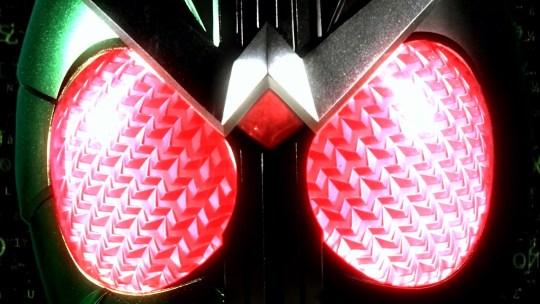
And then the winds blew goodbye.
I've finished W but I'm not done with content related to this series.
When it comes to movies, from what I could find in my research, this franchise is... kinda messy. For example, in the Wikia under the movies section on W's page, they list FUCKING NINE MOVIES. That's a whole bunch of stuff, and as much as I wanna consume the most as I can for this franchise in this little project, I don't have the time, neither the past/future knowledge to dive in most of these pictures since the majority of them are crossovers.
So, with that in mind, I looked up and apparently from those nine movies, three of them are about W or expand on W's world and don't include any major appearance of a Rider of prior seasons that I haven't seen, so these were the ones I've picked to watch. Keep in mind that I'm talking about three movies in a single post which means I won't go in very deep in any of them, in fact, these will be actually very short. My intent here isn't to give a review on each movie, what I wanna do is just give my thoughts on said movies and also prepare myself to the transition between seasons
I think that's enough babbling, let's talk about the movies themselves.
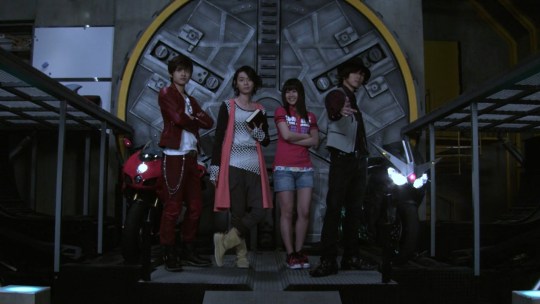
Kamen Rider W Forever
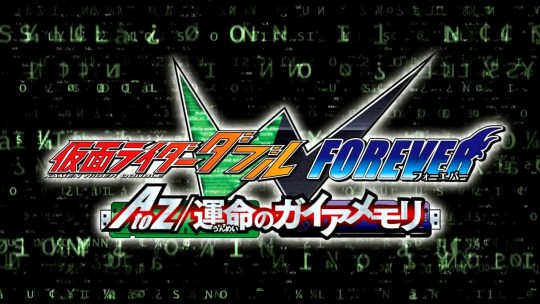
Forever is the standard solo movie of this season, and it is a pretty decent one. The plot is okay, the actors in returning roles are doing a great job, the new part of the cast that joined in for this movie is also good in their roles, and the action is fantastic. It's a little rough on the edges if you watch the theatrical release, but the director's cut has many small transitional scenes that explain things better and make the flow of the movie way smoother, from now on I'll definitely just skip theatrical releases and just watch the director's cut when available.
The biggest features of this movie to me are the action, that is awesomely done since the first second of this movie, and the "fight against yourself/your powers" element, that is a very overused trope but that I still love to see regardless and that was implemented on a very cool way, I loved to see dopants based on some of W's main memories.
However, the positives to me stop there. The movie has a huge problem for me that is the Phillip needy for his mom AGAIN and not trusting his partners AGAIN and being the worst Phillip possible. Now, if you're someone who likes Phillip a lot you may like this plotline, but since I don't I really couldn't care and I wasn't invested in seeing it. It also doesn't help that the villains are kinda bland so any emotional bit falls flat to me, though I must admit the director's cut does make Maria and Katsumi a little more interesting.
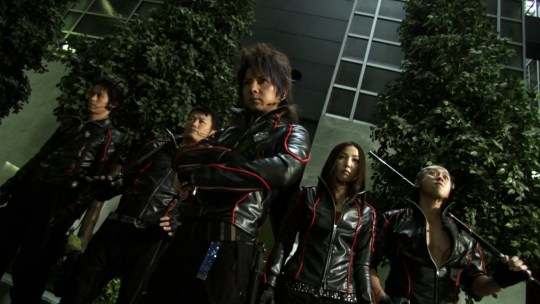
While still talking about villains I have a huge issue with the guy who got the Luna Memory, he's apparently gay and the way he's portrayed under the most offensively and stereotypically light does bug me a lot. I also have problems with some shots the Heat girl had in some scenes, and that scene with Maria and Phillip in the hotel room have some very awkward shots as well that really threw me off. Another problem with villains I have is how underused the Sonozaki family was, they were one of my favorite parts of the show but here they do nothing, all they did was explain what NEVER was and they didn't necessarily need them for that.
Though I think my biggest issue with this movie is the other riders that appear. First, we have Skull appearing and playing an important part, but whoever wrote his participation here forgot that in the show, HE WAS NEVER MENTIONED BEFORE!!!!!!!! And that, my friends, is a bad sign. The other complaint I have is a problem I usually have with the precure baton touch episodes as well that is the new protagonist appearing and stealing the spotlight, if the dude had just appeared going around his coin thingy said a few words and went away it would've been better to me rather than already seeing him transform and even defeat one of the "generals" of the villains of this movie. I feel like this will happen a lot, and I don't know if I'll ever get used to it, but I had to complain about it this time around.
And that's pretty much all I have to say about this one. An entertaining movie, though I wasn't really invested for the most part of it.
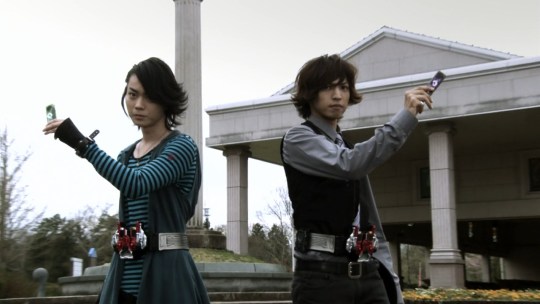
Kamen Rider W Returns: Accel
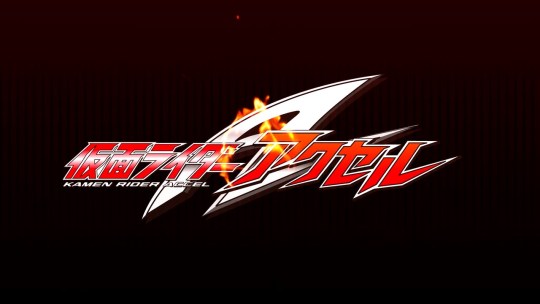
To my surprise, Accel's movie was my favorite out of these three.
I'm not the biggest fan of Ryu, I'm not the biggest fan of Akiko, I wasn't interested in their "romance" in the show, so when I saw this movie was about them and their marriage I wasn't stoked about it. But in the end, it really worked, it shocked me how invested I was after a certain point of it.
It's not to say that this one doesn't have problems. For example, the main form of conflict between the couple is Akiko getting jealous of Ryu because of Aoi, and this to me is the cheapest form of conflict they could make especially when you consider this movie had other elements that could grow into Akiko feeling uneasy about her marriage. Things like Ryu never calling her for her first name or he being absent of home because of work are way more interesting things to explore and that could really shake Akiko and doubt of Ryu's love for her better than the "who's that girl? I don't like her, YOU'RE MINE" mindset the plot evokes.
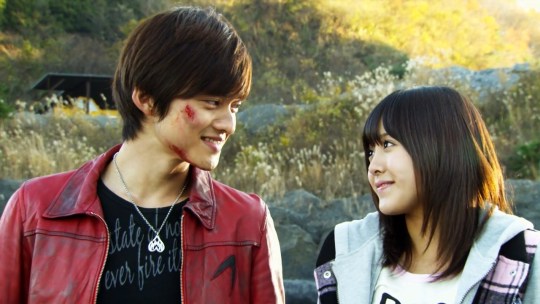
But aside from that, I think that everything else works. First and foremost the action here is sublime, they have some amazing sequences here and you can see where most of the budget was spent. They try to pass the message that people can change and it's pretty effective. The main "mystery" revolving around the identity of the Commander dopant was also pretty good, I mean it was pretty obvious that the dopant wouldn't be the cop that had a thing against Ryu but I still had no idea of who could it be and the reveal got me surprised. I also like that we could finally see Accel's yellow form, I don't really understand how the Yellow is an upgrade since during Trial's transformation this seems to be just a transitional form, but it was really dope regardless so... who cares?
And that's it. It wasn't an ambitious movie, but on its simplicity, it was able to shine and I even found a new admiration for characters that I didn't like on the show, I could see myself rewatching this some time. Great job!
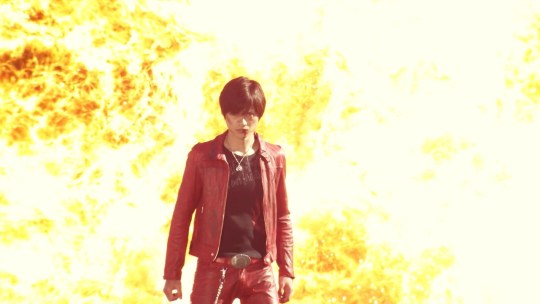
Kamen Rider W Returns: Eternal
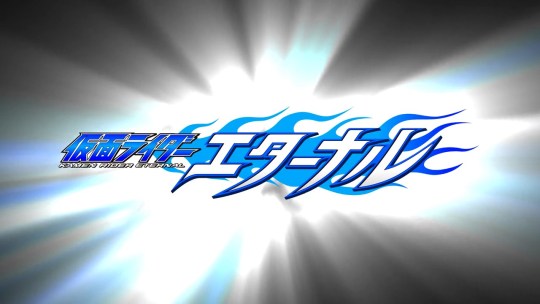
Lastly, we have the movie that gives Katsumi and Eternal a backstory. And this movie gave me a lot of mixed feelings.
Much likely Forever, this movie wasn't bad, but I also wasn't invested in it. I didn't really care for Katsumi and his gang before so coming into this I really had no strong motivation to keep my eyes on the screen. But the movie was good, it was interesting to see other characters in the W universe doing things. I think my biggest problem is just how this movie is just a huge flashback, if we didn't have the scenes with the W cast and Mina in the present I think this would've worked way better because we would have more time to see those characters and get to know more about dopants, NEVER, and Quarks, in a more natural way rather than by having a huge exposition scene with probably the most boring character of this show. Also, the flaws with the Luna guy and the Heat girl are still applied here and they're also bad, though they give those two more of a personality in this movie so it's bad, but not all that bad? I don't know. Like I said, mixed feelings.
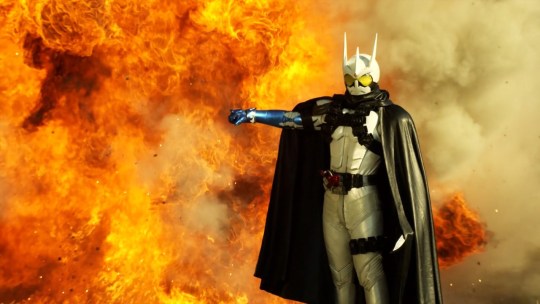
And that was it for the W movies, I'm officially done with the season. Thank you so much for reading until here, sorry if I offended you or a character you like. XD I'll see you guys on Saturday for OOO's first review, bye bye~
7 notes
·
View notes
Text
Alien: Covenant, with spoilers
*Anachronistic post archived from the legacied FB Notes*
THE CINEMASOCHIST: 2017 Summer Blockbuster Review #2
THE EXPECTATION:
This happens to be my birthday weekend blockbuster. Having a mid-may birthday, there has been at least one major tentpole summer blockbuster movie every year as far back as I can remember. More times than not, it’s been a film I’ve been looking forward to.
I have a love-hate relationship with the Alien series at this point in my life. Aliens was actually the first R rated movie I remember seeing as a kid, and it has managed to hold up over the last 30 years as a great piece of action sci-fi cinema. As I grew up and began to learn about film and filmmaking, I fell in love with the original. What has always struck me as fascinating is that this series boasts the single example of genre-jumping that I think worked very well. The original was a horror movie set in space, not only because of it being centered around a stalking monster, but also in its intent. Dan O’bannon (Alien screenwriter) set out to find a thing that would make the audience uncomfortable and push that thing in the audience’s face as overtly as possible. There are dark, sexual undertones in all of the iconography of Alien that scream allusions to rape, the horror of which is the metaphorical center of that first film. It’s not only scary because *monster* or *jump scares*. It’s frightening because it affects us on a deeper psychological level. From the feeling of betrayal from someone we have implicitly come to trust to more literal reads of having a thing forced down our heroes’ throats to the overt phallic and vaginal imagery...it’s not subtle in its presentation of this very real thing to fear in the fantasy of a space movie.
The second film jettisons a lot of that for a much less cerebral and much more visceral experience. It substitutes explosions in the place of the metaphors, dipping its toes into themes of familial relationships (which have even more relevance and resonance if you watch the director’s cut, though I think those omissions in the theatrical release were warranted). It never goes too heavy handed into the psychological the way that its predecessor did. Instead, it masterfully creates tension which pays off in big action sequences. In a sense, it draws on the more pedestrian lore of Alien and extrapolates it into the basis for a very strong blockbuster movie.
The third film is very polarizing among fans and critics. For me, I always enjoyed it. I saw it as another attempt at genre-jumping. From (space) horror to (space) action to (space) melodrama/tragedy. Some of the strongest criticism comes from the fact that it, right from its first scene, essentially devalues the investment into the second film entirely. However, this is completely in line with the fatalist base that David Fincher aims to create.
But after that, the series takes a turn. Alien: Resurrection was Joss Whedon’s lackluster contribution. While the three films that came before it really took chances within their genres and all achieved a particular level of credit for vision if nothing else, Resurrection was more...paint by numbers, for one. It felt juvenile in comparison. It felt like a bit of fan-fiction. Some people prefer it as a *movie* experience to Alien 3, but there’s no doubt that its pandering condescension to its audience belongs more on the shelf with films like Fast and Furious than it does on the shelf with Alien. That’s not to say it’s not without some good ideas and some fun imagery. It just failed in execution, and in comparison to the other films in the series, it seemed almost like homage, knock off, or even parody rather than part of the series’ actual legacy.
Then there were two laughable attempts at Predator/Alien crossover films (which I barely count). The less said about them, the better. The first can be summed up as a cash grab with the sort of plot an eight year old might write. The second I think literally just spliced the scripts of Aliens and Predator together, edited the whole thing down until it was accessible for an eight year old, and then purposely focused on filming the worst parts of what was left.
And then there was Prometheus...the epic return of Ridley Scott to the series. Honestly, no film in the history of cinema has had such a dichotomy between my high expectation and my disappointment (except maybe Terminator: Salvation...). Damon Lindelof did for the Alien series what...Damon Lendelof did for Lost. He guided you down a path of intrigue only to reveal that even he had no idea what to do once he had your attention. So instead of developing an organic story that was anchored around some thematic center, he just stuffed in a bunch of inexplicable things happening and called it a movie. Space zombies and alien abortions and counterintuitive character motivations and a peek into a galactic mystery that ultimately meant nothing...none of it made much sense. It was very pretty to look at, for sure, but it forgot that it should have been about something. It was trying to be Alien in its disconcerting visual design, but in its absence of central intent ended up feeling more like a motion design demo reel with cameos from A-listers. It’s really hard to screw up a film with that strong of a cast, but screw it up, they did.
That’s the Alien universe to date. All that said, it’s weird that I hold the series as a whole in such high regard. We had two great films, one film that was generally polarizing, and then four movies that all were on the scale of bad-to-worse. More than half of the entire franchise’s existence was sub-par, and yet (just like with Terminator, I suppose) I still get excited by the thought of another film featuring a xenomorph.
So with all that in mind, now I need to create a rubric for this film. What does this film need to do in order to work?
One thing is that Alien: Covenant needs to be about something. I feel that this film should aim for Alien level of tension rather that visceral thrills of Aliens. Have a central theme that is the core of the movie. It doesn’t matter if it’s overt or subtle, but have an intended effect or idea...have a reason to tell the story beyond pulling in profits. If Alien wanted to horrify and make the audience feel raped, what does this film aim to do? If the answer sounds more like the untethered narrative from an 8-year-old describing what he does with his action figures, I will be disappointed.
A thing that could go horribly wrong, however, is too much time spent trying to forge cohesion between Prometheus and Alien. The film should not play like a dramatized set of ikea instructions of how to fit rod-A into slot-B. The greatest thing about Alien, Aliens, Alien 3, and even Resurrection to a certain extent is that they really could exist as self contained films. They didn’t cram significant running time with callbacks and cheap a-ha moments. They didn’t need to set up a suggested sequel. Prometheus was nothing short of a phoned-in first act stretched out to feature length. Covenant, despite desperation to cultivate a larger cinematic universe, needs to resist the temptation to create nubs and limbs intended to be explored in other films. Look, it’s a film in the Alien family...we know it connects to the others. We know it will share some iconography. And we can anticipate a nod here or there. But don’t mandate that we watch other media to enjoy this film.
These are my fleeting thoughts prior to seeing Alien: Covenant. After watching, I will review below.
THE REVIEW:
This valiant swing-and-miss demonstrates that the people at the helm don’t seem to understand what made Alien such an iconic film. There will be spoilers beyond this point.
First, let’s look through the filter of my rubric for this film above. Was this film about something, or was it just a catalog of things that happened? Well...it certainly tried to be about something, I think, but certainly not in the manner that Alien was metaphor. In following Prometheus, this film did tie itself around the idea of creation, but it was more an overt, almost Snidely Whiplash villain motivation than a taught thematic undercurrent. For certain, the real reason to tell this story was as a narrative plot bridge between Prometheus and the rest of the Alien universe.
So to the second part of my proposed rubric, it was exactly what I feared that it would be. This wasn’t a prequel to Alien so much as it was a misguided sequel to Prometheus. I guarantee that the studio wanted to distance itself from the luke-warm reception of Prometheus and embrace the public’s affinity for the Alien series, so they gave it an Alien name for marketing value and with some implicit promise that it would be more Alien this time. That just begs the question...why didn’t they do that? If they wanted to push in the direction of the Alien universe, this should have been a lot less Prometheus and a lot more Alien.
I’d say on the first point, the film could be graded as a slacking student; maybe a D or D+. But the context of that barely-passing grade was inextricably mired in the latter point’s failure.
So what went wrong?
You know, like a lot of summer blockbusters, I was actually all in for maybe the first third. Dare I say, I thought Danny McBride was one of the strong points (I better never catch myself saying those words again...). The entire first act, while flawed, was honestly what I was hoping for. It was a slow burn of this inevitability of disaster. It felt like the start to a halfway decent Alien retread, but with enough of its own creative energy that it could’ve worked just fine.
And then right around the time we see our first sorta-xenomorph, things go south. Fast. Let’s start with a little canonical rule breaking (or at least taking extreme liberties). Members of the team on the ground are infected by some sort of sentient, swarming spores that puff out of fungal pods. After a short gestation period, the infected crew members become sick and...out pop really crappy CG xenomorphs (seriously, we’ll circle back on this in a moment), taking on more or less the same features of the products of the face-huggers we’re familiar with. It feels like I have to go on to explain too many inconsistencies to explain my objection to this, but I’ll start simply with it did not feel like this was any sort of outgrowth of the creative universe. Instead, it was more a “What’s a visually cool way can we infect these guys that we haven’t done yet?” It forgoes all the horror of the skittering face huggers and opts for something that feels out of a cheap franchise knock off rather than something that is supposed to be canon. It felt very disconnected from the point of consistency and iconography. It would be like Freddy Krueger killing someone by shooting them. Now, I’m not adverse to these pods emitting spores that have tragic ill effects as part of this narrative. I’m not even adverse to it resulting in some sort of gestation into some sort of creature. But seeing the emergent xenomorph felt cheap and lazy.
Right around the same time, we get these strange, unexplained, counterintuitive character ticks. A medical officer goes into full psychosis freak out panic attack due to a patient’s medical ailment. The new captain takes a scene to talk about the importance of his faith, which never once actually becomes relevant or important to the plot. Slipping on blood gives us not one but two keystone cop type moments. There is no concern over potential contagion despite the distinct absence of all fauna. Despite having clear technological methods to traverse the terrain, they venture 8 kilometers over treacherous mountains on foot. There is a surprising lack of awe in seeing a vastly superior crashed alien vessel, and even more baffling is there is no amazement or discussion of implications (or if it’s there, it happens off screen) about finding “the lost Prometheus’s” Elizabeth Shaw’s dogtags on said alien vessel.
And you know what? Even though all of that was irksome, it was generally, reluctantly forgivable in that “well, you’re not in the volatile situation or understand their context fully, no do you know how you’d react to xyz, so give some artistic license for their manners and reactions” sort of way.
But then the film goes off the rails.
David, Prometheus’s sociopathic android, shows up in cape and hood, to save the survivors with a bright-light gun, and then leads them to this necropolis of former indigenous humanoids. And then, the movie turns from a just-passable Alien film to a weaker sequel to Prometheus.
As it turns out, the mysterious xenomorphs that we fear from this franchise are actually megalomaniac android’s science project, as he tries to perfect the monster-weapon-thing from Prometheus’s *engineer* planet (read: the Alien of of the Alien universe). So much of this as an unnecessary explanation feels like midichlorians-and-battle-droids to me. It’s not exactly a retcon...but it’s this useless, unintuitive, sloppy exposition filler that deflates the magic and mystery out of the compelling, established universe.
And what sucks is the fact that this is what this film is really about. On the one hand, it sucks the life out of the more interesting parts of the series. And on the other, as an explanation, even if you can sort of force it to justifiably work (the way you would with Anakin having built C3PO...), it is really forced as far as adhering to its own themes.
How can I explain what I perceive to be the disconnect in the most succinct way possible? David becomes obsessed with the idea of creation. The disconnected intro to this film, coupled with the events explored in Prometheus, suggest that David is questing for progeny, I guess...because, reasons? Because upon creation, he and his creator discuss the ultimate question is discovering where we came from? Because his calculated ambition for progeny at all costs is supposed to mimic human’s biological imperative? It is so vague that unfortunately, I think I’m reading way too much into it, and I think in all honesty the screenwriters cared very little for themes that made sense. They were just dropping plot points on a line and connecting them with little regard to sense of theme or tone.
Think about how convoluted it is. David wants to procreate in some way. So his best plan for this was...to traverse the galaxy, unleash a biological weapon created by his creators’ creators, genetically modify the result to spawn a perfect organism? It’s such a contrived thing that, again, it sort of just feels like mustache twirling.
In the original Alien, we get what seems like a malfunctioning android. It leads to the crew’s demise. But the whole point is that the android isn’t malfunctioning. The horror of the entire thing is that the android is behaving as programmed, which is at the behest of their very human bosses, to whom the crew is expendable. The horror is watching the android tweak out over the contradiction of Asimov’s first law of robotics versus his expressed, malignant program.
In Covenant, we get an android who is...imperfect and sociopathic, so...kill people to create aliens to fulfill desire for procreation? That just about defeats the purpose of making him an android at all. If he’s supposed to be a murky reflection of humanity here, the parallel should express something like...if David is the creation, and he is willing to destroy his creators in order to bring something more perfect into the world, then that should parallel humans as the creation, destroying their creators (the engineers, I guess) in an attempt to bring something more perfect in the world. But that’s not a thing at all in this universe, so this theme is just flimsy, and it thinks it’s way deeper than it actually is. It’s the intellectual equivalent of the guy at the bar who is 8 beers in and suddenly thinks he’s the best dancer in the world.
I spend so much time talking about this because the movie basically becomes this. In Prometheus, at least we get a suggestion that perhaps to study this xenomorph organism is part of his creator’s programming to help his creator stave off death, and to those ends, the crew is expendable. Here, David the android is just a sociopathic android whose motivations are murky...just something about his ability to create justifying his actions.
This is the core of what’s wrong with Alien Covenant, but it’s not the only thing. It’s so difficult to comprehend how seasoned filmmakers depend so much on CG these days in scenarios like this. Alien, the first film, is almost 40 years old. Its low budget practical effects hold up, and to this day are still terrifying and make the alien into a real threat. The multiple instances of needless CG in this film are deplorable. They completely distract from the scenes. One moment in particular was the birth of the first true xenomorph, bursting out of Billy Crudup’s chest. Literally, this poor CG alien began dancing in mimic to David. It was more reminiscent of baby Groot than it was anything else.
Another thing wrong was that everything that happened was the most predictable thing that could happen in any situation. It leveled all sense of tension that it tried to cultivate when you could predict every single outcome right down to the timing of any given situation.
An example to demonstrate how far the film shifted into nonsensical camp...there was this scene. The heroic, nail-biting rescue of the survivors from the planet has been mostly a success...but the crew must find a way to mourn the loss and handle dramatic new implications of what they discovered on the surface, while at the same time figuring out how to right their course towards their future colonial homeworld. Instead, though, we get a shower-sex scene between two of the crew members (for whom we have zero attachment to), which is interrupted by a rogue stow-away alien. This plays out more like a bad death in a Friday the 13th movie than the tension that the Alien series generally cultivates. It was scenes like this that denote the people at the helm are completely ignorant as to what made Alien and Aliens work so well.
And the worst part is that this weird David-centric prequel arc isn’t over. David brought aboard a pair of face-hugger embryos (is that how they work? I don’t think that’s how those organisms work...) and stowed them with the colonist embryos. His last ship log, as everyone else is in hypersleep, discloses that they are heading for the intended planet, which is distinctly not called LV-426. That means that there is further involvement of David’s sociopathic megalomania to contend with before the two series officially connect. And because of this, we will likely get a third Prometheus that follows sadistic android watering down the potency of the lore even further.
How would I have fixed it? I think the most surefire way to fix this film would’ve been to completely avoid (or dramatically change) the David arc entirely (which means a dramatic change to the whole movie). At the end of Prometheus, David is decapitated, and therefor non-ambulatory. Maybe he should’ve stayed that way, decaying for 10 years with the rest of the tech on the ship. An accident may have caused Shaw to get exposed to the *Prometheus goo*, or as it was in this film, the spores. Maybe a queen gestates. Maybe its result decimates the indigenous population of the planet (I actually would prefer to have the planet uninhabited or abandoned, maybe with eggs or spores or whatever laying in wait). And this film plays out much more like Alien, relaying messages through space about what the crew is experiencing, and giving *the company* its first glimpse of xenomorphs and gives them the idea to utilize disposable colonists to breed the species. Maybe the android-versus-android dynamic could’ve been much more interesting; really, about potential complexities of Asimov’s first law of robotics, laying the groundwork on how or why Ash is able to act outside of this protocol...perhaps even inverting it, where the android Walter adheres to Asimov’s law, defies his direct orders from the company, serves the greater good and destroys the potential threat while incidentally killing crew to save the 2000 colonists in stasis (does not by action of mission, allow humans to be harmed, but having to follow that protocol in an instance where either action or inaction leads to deaths). In the end, we have the colonists on a set course for the new homeworld with no knowledge of the film’s events, but with the company now having knowledge of and desire for the alien species. Cue the future voyage of the Nostromo.
Something like this plays into all the themes explored in a much more narratively taught way that aligns much better tonally with the series. Instead, we get sociopath, megalomaniac android twirling his proverbial mustache.
For the second film of the 2017 summer blockbuster season, I gotta say...swing and a miss. It saddens me that this represents another year of birthday disappointment over a film I was looking forward to.
0 notes
Text
THE FUTURE IS BRIGHT: a *super* unoriginal ‘best films of 2017′ list
In life, we’re constantly asked what we learnt from things. It’s one way of measuring a completely immeasurable experience. Most films are built on this- ’character arcs’- how do they change and grow? What do they learn? (That’s not a negative thing, just the mechanics of this stick out when it’s done badly). With that in mind, I asked myself, from everything I watched this year, what did I learn?
THE BEST 12 ‘FILMS’ of 2017:
The first thing I learnt- films and TV series have become indistinguishable. It didn’t happen solely this year, but 2017 is definitely the ‘flag in the road’ point. Films are increasingly designed so they can be watched on a small screen with headphones, and most TV should really be watched on a big screen with proper speakers. And TV is sort of the wrong word. Netflix isn’t TV. I don’t know what it is. Just Long Form Storytelling perhaps? It’s certainly becoming less and less episodic. More and more feel like 10 hour films split into 10 parts so you can digest it better. So, this list is really the best 12 *things* of 2017.
The second thing I learnt- how you watch something is almost as important as what you’re watching. What headspace you were in, what time of day it was, if the room was totally dark, if someone a few rows in front of you was talking through the movie, if you’d seen the previous instalments in the series, hell- even if you’d seen the trailer. It all adds to how you think about the film. So, on the list, I’ve included where I saw it.
12. THE DISASTER ARTIST (directed by James Franco)
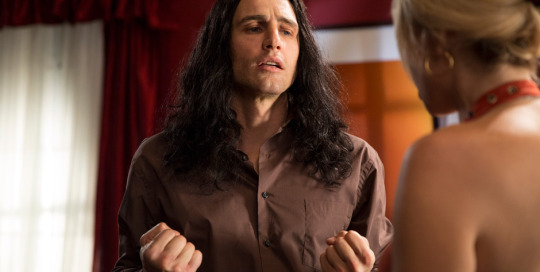
True story about the making of Tommy Wiseau’s The Room, the best worst film ever made.
I cried like I haven’t cried in years watching this. I don’t know what it was. Just something about the last act hit me so hard I couldn’t contain myself. And when you’re trying to contain yourself BECAUSE THIS IS NOT A SAD FILM AND YOU SHOULD NOT BE CRYING EVERYONE ELSE AROUND YOU IS LAUGHING PLEASE STOP CRYING it’s really hard to stop. It’s a story of ambition, heart and following your dreams no matter what.
Green screen! Lovely green screeeeen! Purely on an aesthetic level, whenever they’re shooting against that unmistakable, vibrant colour I just loved it.
You know when films do that thing and show pictures of the real people the film’s about before the credits so you can go ‘wow this film’s so accurate and got that detail right’?? This does a version of that, and it’s the only one that’s ever mattered/will ever matter.
The real Tommy Wiseau also has my favourite film related tweet of 2017:

Seen at BFI Southbank.
11. ORANGE IS THE NEW BLACK SEASON 5 (created by Jenji Kohan)
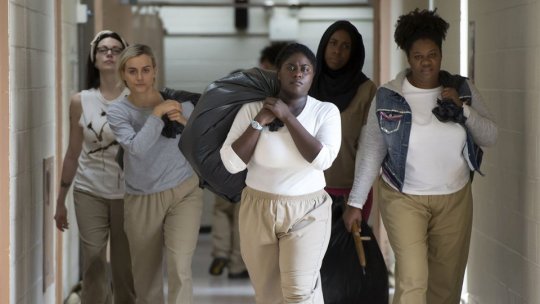
The lives of the women at Litchfield Penitentiary, a minimum-security prison in upstate New York. (the annimalllsss the animalllls, TRAP TRAP TRAP till the cage is fulllll...)
This show is about everything the opening titles suggest- women, decisions and time. What’s striking about OITNB is the characters never serve the plot. Plot *is* character. It’s there to serve them. It gives us a framework to waste time with these characters, because ‘all they’ve got is time’.
Season 5 is brave in terms of content and form. There are thousands of people more qualified to speak about the content, so I’ll leave it to them. Form wise: Orange is the New Black is Netflix’s most watched show, and probably it’s major tentpole along with Stranger Things. It has a well-oiled structure. Each season takes place over a few weeks, each episode focusses us in on one character, complete with flashbacks that inform us how they ended up in prison. Season 5 tears that to shreds, setting it basically in real time over 3 days. When it works, it *really* works. There’s no looking away. You feel the grind of what they’re going through. It sometimes leaves them too much time to pad out and we get some boring side plots- but on ambition alone I loved it.
It’s the perfect continuation and accumulation of previous seasons in many ways. The characters you know and love are in extraordinary circumstances. It brings out sides to their personalities that you never knew were there, but fit perfectly. Where all the characters are situated within the prison after the inciting incident is the best use of character geography *as* character I’ve ever seen. Tonally the series has gradually been getting nastier and nastier for a while, but there’s a scene towards the end of this season which is so nasty and so long and REFUSES to cut away even though you desperately, desperately want them too. It’s raw. It hurts. It’s a scene the show has always been heading for tonally and building towards dramatically.
Season 5 slots in just under 4 for me in terms of ranking them all- but it’s still damn good. One things for certain, 5 changed everything for OITNB. The game is different.
Oh, and Nicky’s the MVP.
Netflix.
10. BAD GENIUS (directed by Nattawut Poonpiriya)
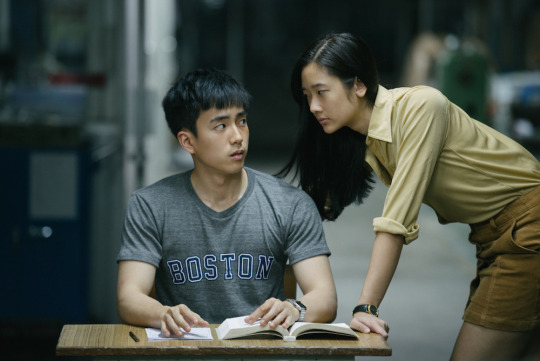
Thai Heist-Thriller. A genius high school student makes money after developing elaborate methods to help other students cheat.
WHAT A FUCKING RIDE!! The most fun I’ve had in a cinema all year. More stakes in this than most ‘end of the world’ superhero movies. Genuinely unpredictable.
The filmmaking is so good it makes you forget plausibility is sometimes being pushed. Amazing set-pieces. Expertly choreographed. Form and content perfectly married. This is the best way to tell this story, like a Michael Mann thriller, a Steven Soderbergh Oceans-style heist.
Every character is so rich and textured in their own way. So fully realised. You’ve met them all at some point in your life. It’s whimsical, but painful and genuinely emotional when it needs to be. Never pulls it’s punches.
2 years time, there will almost certainly be an American remake… and it’ll suck so hard. It’s rooted in Thailand, the socio-economic situation of people, the time zones, the pressure to succeed, and honestly- just hearing it in Thai.
SEE THIS FILM. SEE THIS FILM. SEE THIS FILM. SEE THIS FILM. If you take anything from reading any of this, SEE THIS FILM.
Seen at Vue Leicester Square.
9. NATHAN FOR YOU: FINDING FRANCES (directed by Nathan Fielder)
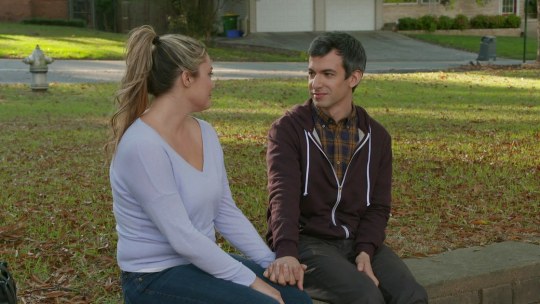
The feature-length finale of Nathan For You’s 4th season. It’s a show that’s difficult to describe without saying ‘trust me’.... but honestly, *trust me*. Nathan Fielder graduated from business school with ‘really good grades’. He offers outlandish solutions to solve problems for struggling small businesses. In Finding Frances, Fielder uses all the resources of his successful show to help an old Bill Gates impressionist track down his high school sweetheart. Trust me.
Nathan Fielder has accidentally and totally on purpose made one of the best documentaries of the last 10 years.
It’s funny how we remember things. Reality and fiction are blurred. Truth is irrelevant. What does real mean? Does it even matter if we remember it how we want to?
Laptop.
8. THREE BILLBOARDS OUTSIDE EBBING, MISSOURI (directed by Martin McDonagh)
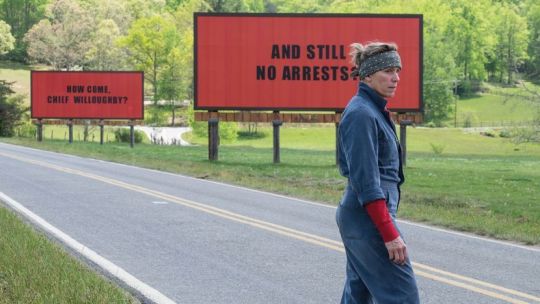
A mother takes desperate steps to pressure local law enforcement to find her daughter’s killer.
Perfectly woven and layered characters. I fucking hate the phrase ‘the character arc’, but if I were teaching a class in it- I’d show this film.
A film about relationships, and every relationship between every character or creature or inanimate object is perfect.
McDonagh loves theatrical sensibilities. Nobody does grand, rich set-pieces quite like him… makes highly stylised situations feel real in the world he sets up.
I could have watched hours more of these characters interacting.
Seen at Embankment Garden Cinema.
7. BLADE RUNNER 2049 (directed by Denis Villeneuve)
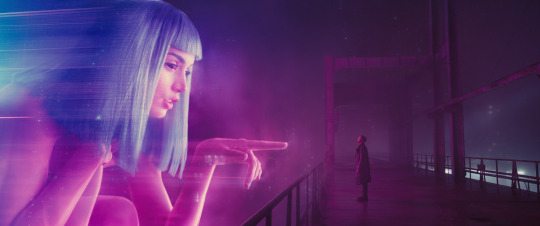
Neo-noir, sci-fi sequel to Ridley Scott’s 1981 classic.
I’m not a fan of the original Blade Runner. I appreciate it! It’s beautiful! and groundbreaking! but I just find it so heartless and cold. I just can’t connect to it. The best sci-fis are amazing stories with really fun furniture (the gadgets, tech etc.) The original is too much furniture for me. In other words, I had no reason to like this one IP wise. 2049 takes everything that could have been interesting from the original and expands on that. The furniture is just that- furniture. An amazing setting that enriches and serves the story. Everything is there to tell the story. I left the cinema feeling I’d experienced something the way that everyone talks about experiencing the first one.
The most expensive art film ever made. I literally cannot believe this exists. I cannot believe they gave Villeneuve £185MILLION to make a 3-hour long, philosophical film that has no blockbuster tropes: no loveable rogue hero; no ‘off-beat’ quippy humour to keep you interested; no CGI extravaganza 3rd act; NO.FUCKING.SKYBEAM with floating garbage spinning around it that threatens to destroy the world and the heroes have to stop it before everyone in the world dies; no setting up 5 other already planned sequels in the franchise so nothing important happens in this one. It’s a rare type of blockbuster in 2017- one that trusts it’s audience is intelligent.
Denis Villeneuve really is the most exciting director working today. This is just further proof. Arrival (2016) still my favourite of his, but I’m almost more in awe of him for this. Taking such a well-loved franchise and doing something new with it in a way that still feels respectful of what’s come before. It’s his film.
The only use of Hollywood’s new trend of digitally recreating actors (ala Peter Cushing in Rogue One: A Star Wars Story) that will ever matter. THIS is how you do it well.
Gender politics (we’re gunna’ go there, SPOILERS AHEAD and I know my opinion doesn’t really matter or count for anything on this just thought it’d be silly not to bring it up, feel free to disagree, v. interested to hear what everyone thinks about this!!) Lots has been written about the treatment of female characters in 2049. Most apt example I can think of to explain how I feel- Taxi Driver (1976), there’s a cafe scene in which the camera lingers on some black characters for uncomfortably long in a kind of parading manner, a ‘look at how terrible these guys are’ manner... it’s very understandable why one could interpret the film itself as racist. I’d argue the film is completely aware of what it’s doing- it’s putting us in Travis Bickle’s eyes, who is a racist character. I mean, we’re literally in his head the whole thing, hearing what he’s thinking and seeing what he’s seeing... I guess what I’m saying is- ‘it’s a decision.’ It’s not an offhand random shot where the filmmaker’s own gaze comes through, it’s a skilfully planned decision to make us question and think about something, in Taxi Driver’s case- what kind of man Bickle is. The treatment of women in 2049 *IS* a decision. It’s not Villeneuve lazily commodifying women, it’s him saying a world where women are only a commodity is a fucking bleak one. It’s a world where real women have been rendered obsolete because the height of success in our society (the CEO of a large corporation), an egoistical white guy with a god-complex manufactures life so women aren’t necessary for continuing the human race, and creates holographic partners for everyday men so they’re emotionally fulfilled without having to engage with actual women. And it’s so horrible. I mean, is anybody happy in this film? Is the picture of the future this film paints bright? It’s a film about how the arrogance of men will destroy everything. And on a base story level, it’s literally about guy who thinks everything is about him... but it turns out to be about a woman. Perhaps it’s lazy for the film to make the decision ‘it’s a patriarchal world so all the women are prostitutes and are treated badly so we’re just gunna’ do that’, but I dunno’... I think there’s more going on. I think Villeneuve is too good for that. I mean his last film was literally about a genius female linguist being the saviour of the world and how a mother’s love is the most precious thing. Would he really do such a U-turn and make a film where the female characters are just objects to be gazed at? I mean- maybe?? If any other aspect of the film felt like it was the studio meddling with Villenueve’s vision I’d buy that... but it’s just SO his film. And I think he’s clever enough to know who the primary audience of this film is- geeky 20 year-old guys. He draws them in with the surface (and all too familiar) images of the female characters, and then turns all of that on it’s head. Just my opinion. Obviously I can never be completely impartial- very happy to be converted the other way.
Seen at Picturehouse Central.
6. CALL ME BY YOUR NAME (directed by Luca Guadagnino)
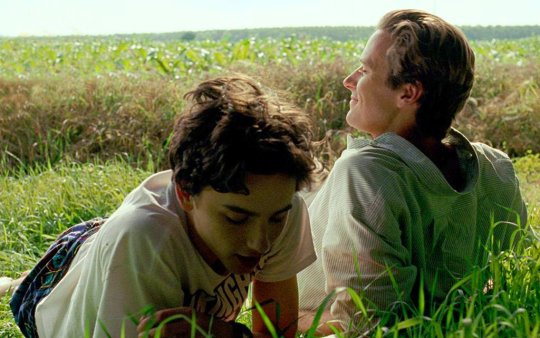
Somewhere in Northern Italy, Summer 1983, Elio’s life changes.
Sun-drenched Europe, the smell of warmth and twirling cigarette smoke, deep blue sky- pure, breakfast with a glass of apricot juice and an espresso, the sound of bike spokes spinning lazily.
I wish I could live with these people.
‘Later.’
The rawest and best final shot in the last 10 years.
Seen at Odeon Leicester Square.
5. THE BIG SICK (directed by Michael Showalter)
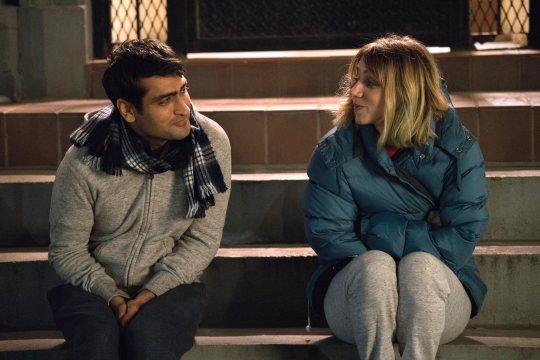
A Pakistani-born standup comedian/Uber driver and a grad student strike up an unlikely relationship.
MAGIC. The perfect retort to use when someone says ‘all rom-coms suck’. A genuine slab of gold that’s as funny as it is heartfelt. And it’s just SO the kind of thing I like.
I’m unbelievably bored of films and just art in general that’s terrified of being sincere in fear of being labelled sappy or over-sentimental. The Big Sick says ‘fuck you’ to that school of thought and goes for it.
Comedy, romance and drama are effortlessly blended- sometimes all in the same scene. And it never feels off-kilter, mainly due to the amazing performances. Kumail Nanjiani, Zoe Kazan, Ray Romano, Holly Hunter and the rest of the cast always play the truth of the scene- not the humour, the romance or the drama, just the TRUTH of the moment.
The perfect antidote to the year 2017 in general.
Seen at Aldeburgh Cinema.
4. YOU WERE NEVER REALLY HERE (directed by Lynne Ramsay)
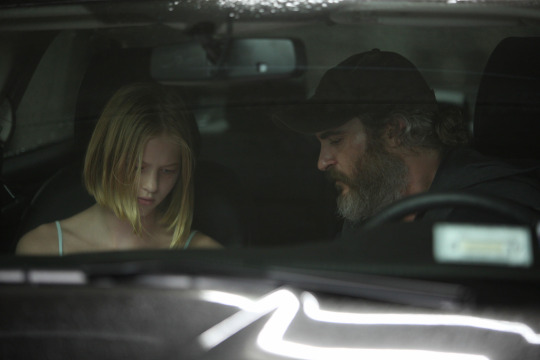
Gulf War veteran Joe rescues children from trafficking rings.
This is a horror. And more terrifying than any jump scare, this whole film is populated by ghosts.
Deeply troubled, deeply disturbed. Beautiful. Precise. Scatter-brained. Focused. A violin strung too tightly, then played by a madman. How can something so stripped down and raw feel so symphonic and wholesome?
There are things in this that will play on loop in my head for the rest of my life. Images and sounds so seared into my brain they find me at the strangest of moments in a day, and I’m always left thinking about them for the rest of that day. It’s clever like that. Joe can never escape what he’s seen.
Francis Ford Coppola famously told press at the 1979 Cannes premiere of Apocalypse Now - ‘My film is not about Vietnam. It is Vietnam.’
You Were Never Really Here is not about PTSD... it is PTSD.
Seen at Odeon Leicester Square.
3. LOGAN (directed by James Mangold)
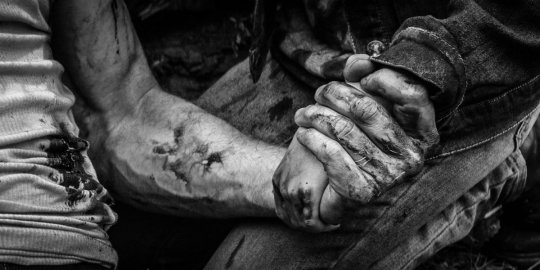
Wolverine’s last outing.
I’m not a huge fan of superhero films. Most are fun. Most are also lazy. Few will survive the test of time. Those that will use all the tricks in their genre box and do something interesting with them, transcend- Rami’s Spiderman 2 (2004), Bird’s The Incredibles (2004), Nolan’s The Dark Knight (2008)... and Mangold’s Logan.
So aged. So weary. Everyone is tired. Tired of running, tired of fighting, tired of living. Like three sharp metal claws jaggedly tearing through flesh, nothing is polished about this. Bloodshot eyes, skin like leather. He feels so much regret. Like most real heroes, he mourns those he couldn’t save rather than celebrates those he did. And it’s eaten him up inside for the hundreds of years he’s lived.
Here I go talking about furniture again... but every piece of furniture (superpowers etc.) is there to serve the story (and here the characters are story). Like so many blockbusters and superhero movies fail to do, this film is about something other than the furniture... e.g. how do you tell a story about dementia that gives someone who hasn’t experienced a family member suffering from it *that* feeling of sadness, loss, embarrassment, empathy and frustration? You give it to Charles Xavier (played by Patrick Stewart), a character you’re use to seeing as the leader, who always has a clever plan up his sleeve and has the ability to control other’s minds. You give it to him, and you force everyone watch the person they respected the most have to be lifted into bed while screaming about fast-food. It’s heartbreaking. Complex. It’s actually about something other than how in superhero world teamwork saves the day. Every ‘plot point’ and moment tells us something about these characters, even to a fault sometimes. SUBTLE: Logan pulling them jammed claws the way an old boy down the pub with arthritis feels his fingers. UNSUBTLE BUT STILL INTERESTING: making Logan fight the only thing he’s truly scared of- literally the version of himself that blindly obeys orders.
Everyone is SO fucking real. Just *watch* the way Daphne Keen eats that bowl of cereal.
Would highly recommend watching the ‘Noir’ Black & White version.
mild spoilers: It also features the best single edit of the year, from Laura stabbing the shit out of some dude to a flurry of scattered drum beats in the score... then that piercing animalistic roar rips through and all is silent... she spins.... from this:
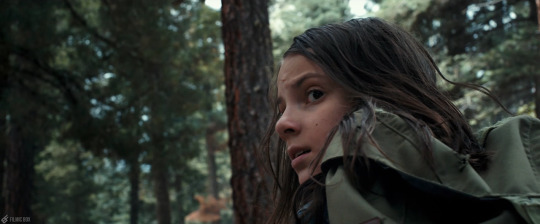
CUT to this:

An empty forest, the roar echoes out... a low bass note tolls like a funeral. Something is coming. Help is on the way, but it’s an untamed, ruthless, violent help. He’s near...
No one single cut has ever given me chills like that before.
Seen at Odeon Leicester Square & Picturehouse Central (Noir version)
2. TWIN PEAKS: THE RETURN (directed by David Lynch)
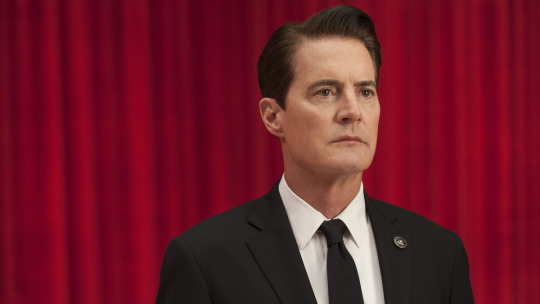
Agent Cooper’s odyssey back to the small town of Twin Peaks. The original series of Twin Peaks that aired in the early 90s is often cited as creating ‘prestige’ television as we know it today- your Game of Thrones’, HBO high-quality, Netflix and so on... 25 years later, David Lynch and Mark Frost have returned to kill it.
Earth-shattering. Groundbreaking. An 18-hour film (split into 16 parts) so layered, so complex i’m not even sure where to begin... and most of what I have to say has probably been written by someone else much more eloquently.
For the first 9 hours, I found The Return mostly frustrating. I love the original series so, so much (and the prequel film Fire Walk With Me is one of my favourite films of all time). When I hit hour 10, it was like all the clouds in my head suddenly cleared. I ‘got’ it. What I thought I wanted was all my favourite characters back again talking about cherry pie and coffee with that soft romantic filter. Lynch and Frost (the creators) knew I wanted that. They also knew I didn’t *really* want that... because, the original series will always exist. They knew nothing would disappoint more than a soft reboot. The Return is it’s own thing- within the universe of Twin Peaks, and... within the actual universe. Seriously, how can you categorise this? It jumps from screwball slapstick comedy to silent black and white existentialist horror to 10 minute live band performances... what is the point of even trying to categorise it?
On some of the individual parts: Part 3 is a low-fi, surrealist, near silent masterpiece. Part 8 is... ‘Pure Heroin Lynch’ and has already changed TV forever. Part 11 is the most satisfying instalment, fulfilling storylines from the original series in a measured and poignant way. Part 17 is the conclusion we wanted, sort of... Part 18 is the start of a new mystery, and one of the most haunting things I’ve ever seen.
Twin Peaks will change you life.
Seen on Laptop.
1. THE FLORIDA PROJECT (directed by Sean Baker)
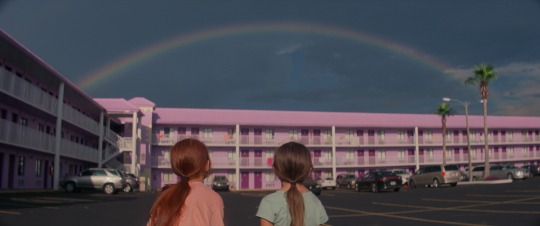
In the shadow of Disney World, 6 year-old Moonee and her friends spend the summer playing around the Motels they live in, while her mother Halley struggles to find a new job.
Pastel bright colours. Every person has survived a storm. Explore the wasteland of failed corporate America. Become a child again. The endless spinning of helicopter blades, a constant reminder of what they can’t do- escape.
Doesn’t ask you to like the characters. Doesn’t need to. Moonee has seen too much. Halley’s anger at herself and her life bubbles underneath every word and action, but she just doesn’t know how to fix it.
It is *SO* achingly beautiful it hurts. I find it hard to even watch the trailer without crying.
For the problems that face Moonee, honorary queen of The Magic Castle Motel, and the impending darkness that’s sure to come, she has the most powerful gift of all- finding hope where there is none.
‘See, I took you on a safari.’
Seen at Odeon Leicester Square & ICA.
DISCLAIMER- things that are not out yet in the UK/I shamefully haven’t yet seen and would likely be on my list too: Lady Bird (further DISCLAIMER i would actually kill somebody to see this) A Ghost Story Raw Phantom Thread War for the Planet of The Apes Coco American Vandal Mindhunter
BEST SCENES:
The third thing I learnt this year- it’s impossible to talk about a specific scene in a film without spoiling it. So... SPOILERS.
The Stairway Fight - ATOMIC BLONDE (directed by David Leitch)
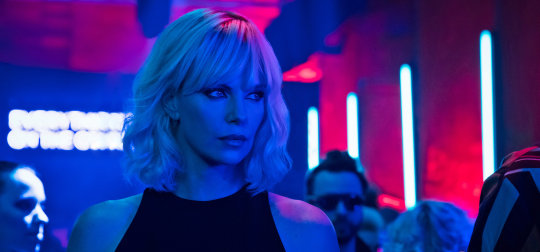
If someone could tell me what the fuck was going on in Atomic Blonde that’d be great but until then I’ll just marvel at how amazing the fight sequences are. Charlize Theron again puts herself at the centre of the progression of American action cinema following her iconic performance in Mad Max: Fury Road (2015). From the first time we see her, lying in an expensive bath healing her wounds and soothing her bruises, we know at some point we’re going to see how she got them. CUE: The 15 minute stairway fight sequence, made to look like a single continuous shot. Leitch and Chad Stahelski (his frequent collaborator and director of the also brilliant John Wick: Chapter 2) are determined to show general audiences what good action scenes look like. This 15-min beauty harkens back to the almost dance like hospital shootout in Hard Boiled (1992), with the rawness and determination of a Children of Men (2006) tracking shot. Charlize Theron (as MI6 agent Lorraine Broughton) fights her way through swarms of henchmen over several floors of an abandoned block of flats, all the while trying to protect Eddie Marsan (who wouldn’t want to protect Eddie Marsan??) Every punch, kick and throw HURTS. By the end, she and the final henchman are so exhausted there’s a sense they might just call the whole thing off- but something pushes them on. Oh, and there’s a 5 minute car chase all part of the same shot to end. Also features the BEST LINE OF 2017. In retort to the final henchman strangling her desperately whispering ‘Take this, bitch!’, she turns the tables, stabs him up hard, then before delivering the final knockdown, pushes her nose to his and asks- ‘Am I your bitch now?’ She doesn’t wait for a reply.
The Eyeless Woman - TWIN PEAKS: THE RETURN (directed by David Lynch)
youtube
Lynch’s best nightmare.
Train Hysterics - LAST FLAG FLYING (directed by Richard Linklater)
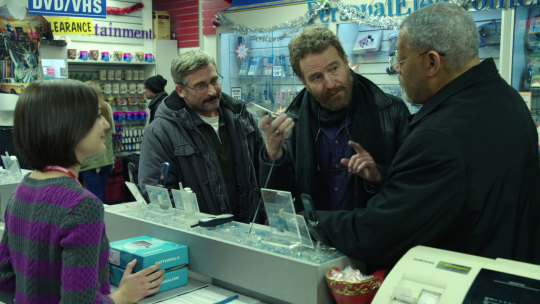
2003. A Vietnam veteran recruits his two oldest buddies, who he served with, to accompany him on a journey no one should ever have to take.
I liked this movie a lot- just missed out on the top 12 list. The standout scene happens little over half way through, the characters sitting in a storage carriage of a train talking about losing their virginities. It’s the best ‘characters uncontrollably laughing’ scene since The Intouchables (2011).
The Snowball epilogue - STRANGER THINGS 2 (directed by The Duffer Brothers)
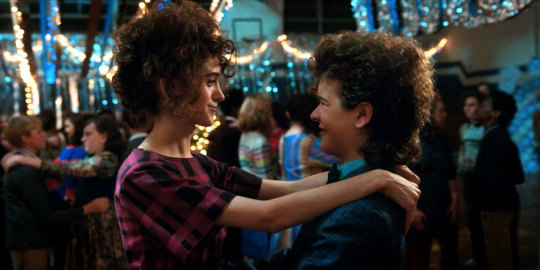
Stranger Things season 2 was super mixed for me. I enjoyed it a lot. Kind of.
The first series is a perfect little story, with a perfect beginning, middle and end. I god damn *love* it’s characters so, so much. The plot was simple remixed 80s nostalgia beats, but really just a vehicle for you to get to know Mike and Eleven and Nancy etc. Think about how much each and every scene was practically designed to reveal more about who they were. It was so beautiful. Season 2 however had wayyyyy too much plot which was obsessed with itself and how cool it was and as a result left characters with nothing to do. In other words, in Season 1 all the characters had something to do because the plot came from them, in season 2 characters were given plot roles... like, explain to me what Mike did all season before he saw Eleven again at the v end of episode 8?? What did Jonathan’s storyline tell us about him we didn’t already know? Sure, they don’t have to set up who they are all over again, but the best sequels never take for granted we love the characters- they give us new reasons to love them.
It’s clear to see whose storylines had natural progressions from season 1 and they knew where they were going, and those they had to think of something because Netflix desperately wanted another season quickly. The only original characters season 2 really worked for were Steve and Will. ‘Steve The Babysitter’ was the perfect progression for his character- him voluntarily discarding his Alpha-Jock status, seeing it was all bullshit, now his caring side comes out. Fuck, think how much you disliked Steve all of Season 1 compared to how much you love and deeply want him to be ok at the end of season 2. THAT’s good writing. His storyline was perfect for his character, it kept giving us new reasons to love him. And Will. Holy shit. His descent into Reagan-level possession was the most engaging part of season 2. Basically all of the story came from him. And Noah Schnapp is so damn good. I think simplicity is the key. His story was unpredictable till the last moments, when you realise it was inevitable. It has a clear premise, unlike most of season 2.
In the first, there were very clear overarching premises from the start- Will Byers is missing, Eleven has escaped from the Lab, the Demogorgon is on the loose. Simple premises that allow our characters to manoeuvre around... Season 2 doesn’t really have one other than Will is clearly still connected to the Upside Down... the Mind Flayer doesn’t really start as a concept till the penultimate episode... Hopper and Eleven living together maybbe?? but we’re not really given enough time with them. Everyone else is left with nothing to do, or something that doesn’t really serve their character... UNTIL THE LAST 15 MINUTES.
The Snowball epilogue was like coming to the surface after swimming laps underwater- I sort of enjoyed the laps but I’d rather just be able to breath. All the self-indulgent 80s nostalgia *plot* is done, and all the characters have interesting things to do!! Steve giving Dustin tips dropping him off, and then that longing look he gives towards the hall. Dustin realising ‘I don’t look like Steve Harrington’ after being rejected by every girl at the ball and dejectedly crying... and in comes Nancy to save the day!! Genuinely one of the most beautiful moments in anything all year (notice how we learn more about Nancy’s true nature in this one moment that anything else she really did all season??) Jonathan nearby keeping an eye on Will and being his helpful self taking the Ball pictures. Lucas ignoring what the rest of the group think about Max and asking her to dance. Will actually going to the ball, acting as normal as he can and dancing with someone!! Joyce and Hopper nervously wait outside and reminiscently share a smoke as they did in their highschool days- contemplating on how they probably won’t ever feel like they aren’t worried about their kids... and finally Mike and Eleven just having a bit of happiness for once- actually going to the Snowball together, a beautiful conclusion after speaking about it at the end of Season 1.
As each moment passed in this glorious sequence, I loved the characters more and more. They aren’t doing anything supernatural or life threatening, but the stakes feel SO much higher than they had all season. It’s real. They aren’t shackled with ‘advancing the plot’, they can just be themselves. And I loved it.
BEST CINEMATOGRAPHY:
Time’s Arrow, Episode 11, BoJack Horseman Season 4 (created by Raphael Bob-Waksberg)
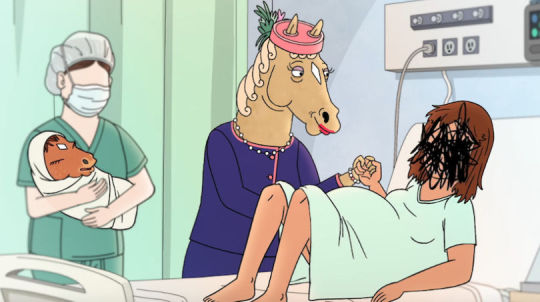
BoJack Horseman has been the most visually beautiful cartoon for a while now, it’s breathtaking season 3 silent underwater adventure Fish out of Water helped to gain it much appreciated wide applause. Time’s Arrow is a different beast. Genuinely horrifying. A mind cracked into a thousand pieces and glued back together into something resembling crazy paving. The animation is disturbing. Really disturbing. The nightmarish images running through the failing mind of an old woman with dementia. Images of her regrets, the neglect and abuse at the hands of her parents. Memories burn and melt away like plastic in a fire. The faceless humans and constant scribble over Henrietta’s face haunts me. Beyond the obvious sinister imagery, it means something. A puzzle with too many missing pieces to really make out what the picture actually is. And we’ll never really know.
It’s not the first thing that pops into mind when you think of ‘cinematography’, but Time’s Arrow is the best visual storytelling since... the previous season of BoJack Horseman.
BEST PERFORMANCES:
Cate Blanchett as various in MANIFESTO (directed by Julian Rosefeldt)
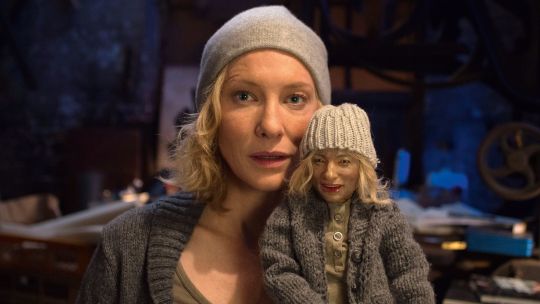
Originally a critically acclaimed multi-screen video installation in which Cate Blanchett plays 13 different characters, ranging from a school teacher to a homeless man, performing artist’s manifestos in 13 different scenarios. Part of the financing deal was Rosefeldt had to cut a 90 minute, linear version of the piece for a cinematic setting.
NO one could have pulled this off like she did. She’s running on adrenaline and pure bravery. She makes interesting choices at every twist and turn. How does looking at her never get tiresome? Every jump from character to character feels genuine. She blew my mind- I knew I was looking at the same person over and over again, but I also *knew* I was looking at 13 different people.
A masterclass.
Kyle MacLachlan as various in TWIN PEAKS: THE RETURN (directed by David Lynch)
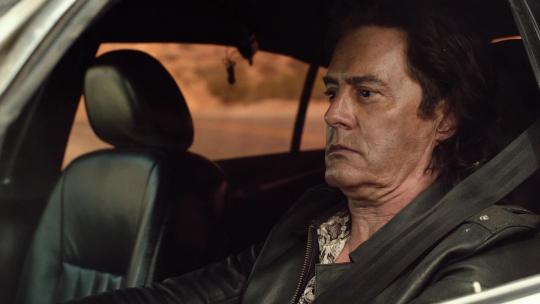
2017 is the year of staggering ‘multi-character’ performances. Kyle MacLachlan’s involvement in the new season of Twin Peaks was basically the only thing anyone knew about it going in. And he is the heart of this season in so many ways. Returning to a character 25 years later must be a daunting prospect, but MacLachlan shows no fear. Not only does he play the pragmatic, joyful Agent Cooper we all know and love, he plays his steely, pure evil doppelganger Mr C, child-like amnesiac Dougie Jones and in the final episode... someone quite special. And he makes it look so damn easy. He is the fabric that holds together The Return.
THE ‘KIDS’ in EVERYTHING
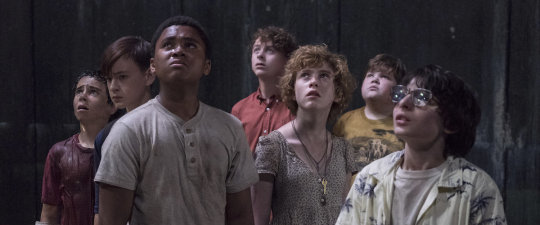
2017 has been a bad year for Hollywood. Ultimately though, it will be looked back on as the turning point. THINGS CHANGE NOW. The old guard is running from their past scared. And they should be scared. Uma Thurman is coming to murder them all. There is no room left for the Harvey Weinstein’s, the rotting core of top-down abuse has been exposed. Brett Ratner can fuck off with his swaggering playboy image and terrible movies.
What is truly uplifting is who is going to replace them. A new generation of pure, true artists that this year has shone a spotlight on.
The future is Brooklynn Prince and Bria Vinaite, stars of The Florida Project. The future is Timothée Chalamet, whose central performance in Call Me By Your Name is the realist, rawest thing ever. The future is Saoirse Ronan, the next Meryl Streep. The future is Daniel Kaluuya, who has finally gained world-wide recognition for his stunning leading performance in Get Out. The future is Finn Wolfhard, Millie Bobby Brown and all of the kids from Stranger Things, who masterfully manage the horrific pressures of being thrust into the tabloid spotlight at the same age most of us just want to cry in our rooms. The future is Sophia Lillis and the rest of the Loser’s Club from IT (a film with the most oppressively terrible sound design ever yet they still manage to make it fun and watchable.) The future is Daphne Keen, the best on-screen cereal-eater who almost steals the film from Hugh Jackman in Logan. The future is Lucas Hedges, someone with rare human fingerprint over every word he speaks in Three Billboards and last year in Manchester By The Sea. The future is Donald Glover, the most creative, multi-talented young artist alive. The future is Caleb Landry Jones, who’s had maybe the most impressive year, with standout supporting roles in The Florida Project, Twin Peaks: The Return, Get Out and Three Billboards Outside Ebbing, Missouri. The future is Tessa Thompson, the best thing about Thor: Ragnarok. The future is Michael B. Jordan, Chadwick Boseman, Lupita Nyong'o, all the team behind the upcoming Black Panther film, helmed by Ryan Coogler. The future is Barry Jenkins, director of best picture winner Moonlight. The future is Daisy Ridley, John Boyega, Oscar Isaac, Adam Driver and Kelly Marie Tran, the new faces of the most popular franchise ever. The future is Alice Lowe, a force to be reckoned with. Writing, directing and starring in a feature film is difficult enough. She did all of that while heavily pregnant. Oh, and it was her debut feature. It’s called Prevenge and it rocks. The future is Ava Duvernay, a beacon of hope- cannot wait for A Wrinkle in Time, which drops early next year. The future is Sean Baker, the most empathetic filmmaker working today. The future is Patty Jenkins and Gal Godot who have revolutionised the superhero film and inspired a generation of little girls with Wonder Woman. The future is Kumail Nanjiani and Zoe Kazan, who I’ll follow in whatever they do after The Big Sick. The Future is Jordan Peele, the most exciting new director. The future is GRETA GERWIG, mumblecore queen turned saviour of cinema.
So, what did I learn this year? Well, Agent Dale Cooper is certainly one of the best characters of all time. But most of all: amongst the darkness of everything that’s happened within the film industry in 2017... there’s hope.
The future is bright.
1 note
·
View note
Text
SUMMARY This film is set in a post-apocalyptic wasteland where few fertile men and women exist due to atomic fallout. As a result, the government places a high priority on those that can still breed. Shortly before the movie opens, a group of mutant amphibians (who have been exiled to the desert by humans) capture a group of fertile women and are using them as sex slaves.
Sam Hell (Piper) is a nomadic traveler who wanders the countryside. He is eventually captured by an organization of warrior-nurses, the closest thing to a government in his region of the world, who reveal that they located him by tracking the trail of pregnant women left in his wake. Their original plan was to use him as breeding stock with their collection of fertile women, but this was the group captured by the mutants. With their own attempts to capture the women failing, the group presses Hell into service as a mercenary; he is to infiltrate the mutant city (derogatorily referred to as “Frogtown”) and rescue the women. To make sure that the rebellious Hell follows his orders, he is forced to wear an electronic protective codpiece that will explode if he disobeys or tries to abort his mission. Having already taken numerous samples of reproductive material from him, he is now deemed far more expendable than the women themselves. To aid him in his mission (and make sure he follows the plan), he is paired with one of the nurses, Spangle (Bergman), and an aggressive guard named Centinella (Verrell).
During their journey to Frogtown, Hell tries numerous times to escape but quickly learns that a device Spangle carries will shock his genitals if used or if he gets too far away from it. Despite their rocky start and Spangle’s initial cold demeanor, the pair grow closer during the journey and eventually fall in love. When they reach Frogtown, everyone involved is captured. The frogs’ second-in-command, Bull (Nicholas Worth), tortures Hell and attempts to remove the codpiece for its technology. Meanwhile, a slightly drugged Spangle is forced to work as a slave and dance for the frogs’ Commander Toty (Brian Frank) in the notable “Dance of the Three Snakes” sequence. Proving more successful than she had wished, the nurse soon finds herself at the mercy of the aroused commander. However, with the codpiece now removed (Bull finally removed it with a chainsaw, but it blew up and killed him), the escaped Hell rescues her along with the group of fertile women (Ellen Crocker, Kim Hewson, Ilana Ishaki, Annie McKinon and Janie Thorson) held captive.
DEVELOPMENT/PRODUCTION Donald G. Jackson had directed a $70,000 16mm direct-to-video feature for New World’s video division: ROLLERBLADE, a tale of “futuristic rebel nuns on skates with knives, “according to Jackson. On the strength of that project’s overseas sales, New World asked him to pitch ideas for another low-budget, direct-to-video feature. Jackson pitched HELL COMES TO FROGTOWN, a tongue in-cheek post-apocalypse action-adventure story, which he described as “ROAD WARRIOR meets PLANET OF THE APES, except they’re frogs.”
This slideshow requires JavaScript.
New World loved the script by Randall Frakes, who was supposed to co-produce the film with Jackson, and agreed to finance the project, which was to be shot 16mm, non-union, for $150,000. It was then that the project began to balloon. New World wanted a name in the cast and suggested Sybil Danning for a role intended for Suzanne Solari, who had appeared in ROLLERBLADE. As a bone, Solari was given the small part of a nomad girl in the film. Jackson did not think Danning was right for the part, so New World offered it to Sandahl Bergman, who was finishing up a two-picture contract with them. Unfortunately, the casting of Bergman meant that the whole film had to be cast SAG, which immediately raised the budget to $500,000. New World’s video division could not afford that price tag, so the film was moved over to the feature division where executives questioned whether the script’s extensive action and stunt requirements could be achieved for half a million dollars. They rebudgeted the film somewhere between $750,000 to $1,000,000.
This slideshow requires JavaScript.
“Then I got the phone call,” said Jackson. “They basically said, ‘We’re not going to trust you with a million dollars, but here’s what we’d like to do, because we like the project: we’ll give you a million, but we want you and R. J. Kizer to co-direct.” Kizer was the editor New World brought in to direct scenes of Raymond Burr for GODZILLA: 1985. Jackson was not pleased to lose control, but ultimately he decided it was a better career move to go for a bigger-budget theatrical release than another low budget video. New World brought on line producer Bill Edwards, who did not think the script could be shot for $1,000,000. He and executive in charge of production Neal Nordlinger raised the budget to $1.5 million. While at Alan Lansburg Productions, Nordinger had co-produced JAWS 3-D.
This slideshow requires JavaScript.
Said Jackson, “We had five accountants, two directors, three producers, one executive in charge of production and two executives in charge of the executive in charge of production-so everybody had his finger in the pie, getting their friends jobs instead of spending money on the film. They wouldn’t hire the lighting guy I wanted, so I had to pay additional money out of my pocket to get the right guy.”
The first and only time I ever saw the movie with an audience—prior to a couple of months ago—was on the old MGM lot in Culver City. The Cary Grant screening room. The audience was made up of the crew and some of the cast, and the movie dropped like a 10-ton stone into mud. I hated the movie. Hated it. Looking at it was like staring at a wrecked career. My friend William Wisher—who I mentioned earlier, and who was amazed my dopey script even got made—came up to me afterward and said, “I’m sorry they screwed up your movie, Randy.” That was the nail in the coffin. But I must also say that a few months ago, when the Cinefamily Theater here in L.A. did a one-night Rowdy Roddy Piper memorial screening of They Live and Hell Comes to Frogtown, the audience seemed to get all the jokes as intended. They were extremely appreciative and enthusiastic in their response. So, despite all the ruinous stuff that happened to compromise Frogtown, it evidently still hits the mark well enough for some people who like weird and funny stuff to enjoy. For that, I am grateful. And producing that movie was a huge learning experience, an on-the-job training that has helped me navigate this silly business and the people who presume to run it. – Randall Frakes (Producer/Writer)
The film went into production with former wrestler Rowdy Roddy Piper in the lead role of Sam Hellmond and frog masks by 21 year-old Steve Wang. Unfortunately, despite the rising budget, Wang’s budget was never increased, limiting what he could accomplish, so most of the mutant frog people are rather inexpressive. However, the radio-controlled mask for Commander Toty, the chief villain, features an impressive range of expressions, including bulging eyes, flaring nostrils, and flickering eyelids.
This slideshow requires JavaScript.
The production soon ran into trouble. Despite early agreements on a cinematic style inspired by samurai films and Italian westerns, Kizer and Jackson were just too different in their approach. “I knew it wouldn’t work I’m sure he didn’t like being in that position any more than I,” said Jackson. “R. J. in my opinion never liked the project. He wanted the money and the directing credit.”
Another major source of friction arose regarding the film’s photographic look. Jackson, who according to his usual practice was photographing as well as directing the film, clashed with the movie’s art director. “The executive in charge of production had a friend of a friend who had never been an art director – he was an architectural draftsman. I never liked the way he dressed the sets, and I kept changing them around to make them look good for the camera which really upset him and the executive in charge. All my sets looked better after being redressed. He was building them like for a stage play, not for a movie. He didn’t age it-everything was too new. I kept taking cans of flat black paint and aging everything down.
“After doing this for ten days, the final blow-up was in the bar scene. They had blow-up sex dolls, I found that really offensive. They had naked mannequins, I found that offensive. They had this big poster of Reagan as Max Headroom, which the guy had swiped from a Doonesbury cartoon. So I wanted that all torn down. I got in a violent argument with the art director, who said he was gonna quit. I wish he had. He didn’t.
“The next day, when I came to work, they said, “There’s a new cinematographer, and he’s not gonna fuck with the art director.’ And I was told to watch they didn’t want me to talk to R. J. on the set, only in the trailer, so he was happy.
This slideshow requires JavaScript.
“So I watched. I got tired of watching after six hours, so I grabbed a camera, went outside, and put together my own 2nd unit crew and started shooting a lot of insert shots. We shot two cameras on the pyrotechnics and fights and shot a lot of closeups of fingers pulling triggers and so on.”
By this time, Jackson’s co-producer Randall Frakes had already been fired for insisting the film be shot as written. Said Jackson, “The script was cut so drastically by Neal Nordinger and R. J. Kizer it no longer resembled the action script we wrote. New World said we couldn’t afford it, but I’d just shot a whole movie for hardly any money so I know it can be done.
“When I was shooting I was going as fast as anybody could go and everybody was complaining it wasn’t fast enough. As soon as they put on another d.p., the pace slowed down to one-half. The original schedule was twenty days. They shot twenty-two days principal, plus five more days of pickups because they didn’t cover the action properly-it wouldn’t cut together.”
The final product pleased neither Jackson nor New World, who, ironically enough, now plan to release it directly to video rather than theatrically.
Donald G. Jackson Interview Tell us about the genesis of Hell Comes to Frogtown ? Where did you find the inspiration for frog mutants ? What kind of deal New World proposed to you ? And how do you feel about that afterward ? Donald G. Jackson: There is a section of Los Angeles known as Frogtown. The story goes, that back in the 1940s this area was overwhelmed by a large invasion of Frogs — which is why it got its name. I had a friend Sam Mann, who was one of the actors in Roller Blade and lived in this area. We were driving along one day and he came up with the title, Hell Comes to Frogtown. From there, I ran with the idea and that is how the movie developed.
New World had made so much money on Roller Blade they offered to finance Hell Comes to Frogtown. My original plan was to shoot the movie with Sam Mann and Suzanne Solari (both from Roller Blade) as the leads. I was going to shoot it on 16 mm, with my Bolex — as I had done with Roller Blade. But then, New World decided they wanted to “Up” the budget. The problem is, the minute you let the devil in the door, the devil is going to take control over you. And, that is what happened with New World and Hell Comes to Frogtown. They decided that they wanted to cast name talent and take over the production of the film. So, the movie evolved from being a 16 mm art film, to a relatively high budget 35 mm cult movie. Sadly, my friend Sam didn’t get to play Sam Hell and Suzanne was only given a small part in the film.
Were Roddy Piper and Sandahl Bergman your firsts choices for the roles of Spangle and Sam Hell ? What were they like on the set ? Donald G. Jackson: No, as stated, my original plan was to shoot the movie with Sam Mann and Suzanne Solari as the leads. But, New World wanted to use Roddy Piper as he was a very famous wrestler at the time — and this was going to be his first movie.
As a fan of wrestling, I was happy to have him. But, as you can understand, what occurred was not fair to my friend Sam. I think I may have made the wrong choice by not standing by my friend Sam, who actually came up with the title and the idea for the movie. But, I spoke with him and he seemed Okay with what was happening. Though Hell Comes to Frogtown is, no doubt, my most famous feature, by my accepting New World’s offer, I believe it did set a lot of bad karma in motion.
Regarding Sandahl Bergman: She had just finished Conan: The Barbarian, and they wanted to use her for her name power, as well. I had very little to do with any of the casting of the film. Again, this is the problem when a large production company becomes involved in a project — the actual filmmaker is allowed very little creative control. Which is why I have never again worked with a large production company. But, Piper and Bergan were both very nice people to work with.
Anything to say on Cec Verrell (Centinella)? Donald G. Jackson: No, just somebody cast by New World. Also, very nice
The “Dance of the Three snakes” scene didn’t really stand its promises ? Did Sandahl Bergman have something to do with that ? Donald G. Jackson: In the script, Bergman’s character was to be naked in this scene. On the set, she would have nothing to do with nudity, however. So, it was one of those power struggle things happening between the actor and the director. Due to New World’s influence and decision, the actor won.
William Smith is one of my favorite actors. How did you get in touch with him ? He would have made a perfect Sam Hell too, don’t you think ? Are you still in touch with him ? Donald G. Jackson: Yes, Bill is a great actor and a great friend. He has been around the film industry forever. And, I have known him for a lot of years. I put him in my films whenever I can.
Nicolas Worth is also brilliant, even under his heavy make-up. A very talented actor. Did you notice him from his creepy performance in Don’t Answer the Phone (1980) ? Donald G. Jackson: No, he was cast by New World.
The makeup of the Frogmen are excellent, could you tell us about that ? Donald G. Jackson: Steve Wang who went on to direct films like Kung Fu Rascals, The Guyver, and Drive was the main force behind the frog masks and make-up. He is a great guy and has gone on to do a lot of special effects work for a number of very big feature films.
This slideshow requires JavaScript.
There’s always comedy coupled with eroticism and sexual content in your movies that remind me of the films of Russ Meyer. Do his films form part of your influence ? Donald G. Jackson: Some of Russ’s stuff is great. Particularly when you think that he made them without the help of any of the big studios. But, he has never been an influence to me. It was more the avant-garde films from the 1960s like Dr. Chicago and Chinese Fire Drill that really inspired me as a filmmaker.
I think you’re also a car lover and “Hell Comes to Frogtown” showcases two amazing cars, were they part of your own collection ? Donald G. Jackson: Yes, I am a big fan of classic cars. I love the cars made in Detroit from the 1950s and early 1960s. One of the cars in Frogtown is a 1962 Plymouth Belvedere. I found and purchased two at the same time. One, we customized for the film and the other one I customized to my own specification and have driven ever since.
R.J. Kizer, the guy guilty to have shot the useless and ugly new scenes of the American version of The Return of Godzilla is often credited as the co-director of Hell Comes to Frogtown. Why ? Was it imposed to you by New World ? Why ? What was your relations with him on the set ? Of which part is it exactly responsible in the final cut of the movie ? Donald G. Jackson: Like a lot of people in the film industry, I sometimes say things, trying to soften the reality of what actually occurred in a particular situation and trying to make it more understandable for those who have never made a film. But, now is the time for me to spell out the truth.
Hell Comes to Frogtown was my baby. Though I have been the one to get the most press from the film, regarding Kizer, again, New World took over the project and said that was part of the deal — Kizer was going to be the co-director of the movie. Even though I was the creator, my complete creative control was taken away. New World became angry at my desire to maintain control over the project and I was eventually removed as the director and banned from the sets. There was never any collaboration.
Regarding the final cut of the film, New World handled it. Though I watched some of the editing — they didn’t like my flaring temper, when I didn’t like something I didn’t like. Again, this is why I have never worked with another big production company. Because it just takes all of the creativity away from the filmmaker.
CAST/CREW Directed Donald G. Jackson J. Kizer
Produced Donald G. Jackson Randall Frakes
Written Donald G. Jackson and Randall Frakes (story and screenplay)
Roddy Piper as Sam Hell Sandahl Bergman as Spangle Cec Verrell as Centinella William Smith as Captain Devlin/Count Sodom Rory Calhoun as Looney Tunes Nicholas Worth as Bull Brian Frank as Commander Toty Julius LeFlore as Squidlips Eyde Byrde as Patton Lee Garlington as Briefing Officer
Special Effects by Grant Arndt … creature effects Wayne Beauchamp … pyrotechnician Makio Kida … creature effects Crit Killen … creature effects David Kindlon … creature animatronics (as Dave Kindlon) Steve Patino … creature effects Matt Rose … creature effects Johnnie Saiko … creature effects Steve Wang … creature effects Ed Yang … creature effects
CREDITS/REFERENCES/SOURCES/BIBLIOGRAPHY Scottshaw.com slashfilm.com Cinefantastique v18n05 Imagi-Movies v01n04
Hell Comes to Frogtown (1988) Retrospective SUMMARY This film is set in a post-apocalyptic wasteland where few fertile men and women exist due to atomic fallout.
0 notes
Text
ART OF THE CUT with “IT” editor, Jason Ballantine, ASE
Jason Ballantine, ASE (Australian Screen Editors) has been in the film industry since 1992 and is currently living in Los Angeles. He has won and been nominated for several Australian Awards for The Great Gatsby, Wish You Were Here and Wolf Creek. He was also a part of the Oscar winning team for Mad Max: Fury Road. In this installment of Art of the Cut, Jason and I discuss his most recent feature, Stephen King’s IT.
Guy to the left in pink shirt, Post Supervisor Darin Read; girl in maroon shirt, VFX Co-ordinator Petra Mcelvenny; girl in grey shirt, VFX Editor Lara Ramirez; guy in red shirt, editor Jason Ballantine.
HULLFISH: Let’s start by talking about the unique pacing and rhythm of editing horror. It does seem like the rules are a little different.
BALLANTINE: I like cutting horror movies but like you, I don’t usually seek them out for personal entertainment. What I do like is they require a collection of cutting rhythms. First and foremost, a horror film is only as good as an audience’s emotional commitment to the characters. Some screen time must be dedicated to this point, before taking the audience on the ride.
In terms of different rhythms that could be employed, it’s all an endeavor to provoke an emotional reaction appropriate to the scene, whilst avoiding being predictable or repetitious. For example, holding shots for an overly drawn out suspenseful type approach or perhaps a frenetic fast cut chase. Then of course horror’s unique tool, the jump-scare. The challenge is to tackle each story beat in a fresh new way. Director Andy Muschietti and I were very conscious of this. There’s nothing more satisfying than experiencing an audience’s visceral reaction.
Every film tends to suffer from the ‘main-cast forcefield’ syndrome. You know, where the secondary cast members fall victim so easily but the villain never seems to be too aggressive with the lead cast. That’s an expectation audiences carry that can play against you. IT isn’t what I’d call a horror film. I think its strength lays in the sterling relationship of the Losers. I’d describe it as a ‘coming of age’ film with jump scares. I think the film is as funny in parts as it is terrifying. As sensitive as it is suspenseful. That is the real editorial challenge right there.
HULLFISH: When I think of these unique thythms to horror, there’s a scene where one of the local bullies is down in the sewer and encounters this incongruous balloon, and the shot holds and holds and holds, before finally the tension snaps violently.
BALLANTINE: Landing the proper timing for that is a lot of trial and error. The toughest thing for any editor in any form of editing is maintaining an objective view. It becomes a challenge to second guess timings that you are possibly too familiar with.
This sequence went through so many permutations of Hockstetter stalking, flaming the aerosol revealing the dead children and then his own demise. There was a lot of coverage offering a lot of options to trial.
The entire film was a matter of experimenting for the best result. We went through many audience preview screenings, nine in fact. Newline Execs Walter Hamada and David Neustadter are very keen to use this tool for story feedback. It’s a necessary evil. Nothing is more confronting than screening a work in progress to the general public. Especially a title like IT which has such high expectations. However, the test audience feedback always surprises me for how positive it can be for what the film needs. We would study the audience written response cards as well as the recorded video of the audience watching the screening for particular reactions.
IT director, Andrés Muschietti
Of course, the other supporting creative tool is the use of sound, both effects and music. Sound effects can help create an environment and/or motivate a character’s action. The music, even in our temp form during the editing process, helped assist in driving emotion. Lise Richardson, the Music Editor, helped enormously in preparing a temp score for test screenings. Needless to say, both elements were perfected in the final mix by Music Composer Benjamin Wallfisch and Sound Supervisor Victor Ennis.
HULLFISH: So Let’s talk a little bit about those sound effects and soundscapes. How much does sound have to play in the rhythm of the cut? A lot of people like to cut with the sound on mute, but with some of these cuts, I’d think the sound would be crucial to the timing, or were the visuals determined without the sound effects?
BALLANTINE: If it’s really intense action cutting, then cutting silent is a real benefit because production sound can get nasty and distracting. Picture rhythms are easier felt without sound at times.
As previously mentioned, sound is its own creative device which ultimately helps the picture cut and therefore the storytelling. In a suspenseful scene, for example, sound effects play a huge role in driving the character and motivating them through space. The other big question is what is the music doing at any moment. Is the music creating a sense of anticipation or suspense? Is the scene better served with music completely absent? There’s no one set of rules. These elements, rhythms and devices are just a part of an elaborate bag of tools. You must experiment and then basically trust your gut feeling as to what’s most true for the moment.
Outside these granular considerations, there are challenges with story flow. Inevitably the challenge for this film is each of the seven Losers have their own personal experience with Pennywise. And how do you treat those differently so that it doesn’t become episodical and monotonous? So it becomes a question of scene placement as much as the internal metronome the scene might carry in the cutting pattern.
HULLFISH: That’s really interesting. It’s a great point. So you’ve got these “episodes” and they can’t all be the same. Do you remember some of the ways that you tried to make them different? Or did you ever realize, “This is starting to feel like that other one and I’ve got to do something about it?”
BALLANTINE: We were definitely conscious of trying to mix the rhythms up. Each encounter became somewhat more elaborate for the jump-scare in terms of what was shot. The first assembly was massively long. It was over three and a half hours and that was the fine-cut scripted length – not a sloppy assembly. So it did mean that screen time had to be dropped, either through the tightening of existing sequences or even scene deletions.
The scene with Ben in the library was actually quite a lot longer. There was a whole downstairs sequence where Pennywise’s head kind of flowered out of the headless boy’s shoulders. But it was just rhythmically way too long.
There’s a moment where Ben is being chased through the library shelving and as he does an L-shaped turn – suddenly Pennywise is right behind him. That’s actually a flopped shot which is stolen from that dropped portion. It successfully achieves the jumpcut shock in the most forceful visceral manner, but it’s non-sensical in terms of “How did Pennywise get there?” The fact that Pennywise is a shape-shifter seems reason enough.
HULLFISH: I remember that cut and I didn’t question it at all. You said the assembly was over three and a half hours. How long was the final theatrical cut?
BALLANTINE: The final is two hours and nine minutes, not including the end credits roller. From memory, the first editor’s assembly was three hours and forty minutes and then after the director’s cut, we were hovering just under the three-hour mark. Then we went through studio notes and audience screenings to further work the cut.
Not only are there film rhythms, but there are also filmmaker rhythms. Cutting a film is a marathon, not a sprint. You have to emotionally and physically pace yourself. Thinking of the test screening process, I recognise a pattern heading into them thinking, “I’m pretty happy with the way this cut is feeling.” And then, about 10 minutes into the screening, I’d be thinking, “Oh my God, I have so much work to do.” You see where the audience is engaged or restless. Are they verbally expressing their excitement (or fright)? Are they outwardly rooting for the good guys or laughing out loud? All those fun things an audience will do as a collective. And if they don’t when they should, well …
Panorama of Jason Ballantine’s “IT” editing room. (Can be opened on another page as hi-res) option-click on photo.)
HULLFISH: I’m always fascinated by the way that just watching the film with an audience gives you such a different feeling of what you saw when you were alone in the cutting room.
BALLANTINE: You can definitely feel it. There were variations between audiences too, where we didn’t change the edit in that particular area, yet the reactions were different. Some audiences are yelling at the screen and others are more reserved. But in terms of the comments on the cards and the all-important score (out of 100), there’s not too much variation — maybe five points. So you do get these analytical discussions after a screening because the audience won’t really be precise in their written expressions. You have to kind of interpret what they’re saying. The audience might nominate one scene that’s the problem. But that scene isn’t necessarily the problem, it’s just the result of a feeling they had. So you have to be careful not to terminate moments but use your innate knowledge of the film to best determine how to broach a solution.
My favourite example is when someone will write “I hated the baddie.” Was that because they were a poor character or well portrayed and doing the assigned job?
HULLFISH: I had that exact same thing, where a specific scene came up as a very negative scene. And we figured out that instead of changing that scene we changed a scene that happened 10 minutes earlier and that took care of the comments about the later scene.
BALLANTINE: I really love that. That’s what’s so fascinating about the finer details in formulating a film. We had to drop a few scenes as I mentioned. Like Henry, the lead baddie. He had a couple of scenes dropped because the scripted placements were in a portion of the film that test audience feedback was nominating as the pace slowing. This was coupled with other feedback that they didn’t care so much for the character, given the pain Henry was inflicting on the Losers, even though Henry was suffering his own home abuse. So those scenes were a benefit to Henry’s backstory, but they were a detriment to the film’s pacing and audience empathy levels.
HULLFISH: A lot of the action editors I’ve talked to about the importance of cutting action say you need to make sure that you care about the characters before the action happens. I would definitely say it’s true for this movie that you really care about the heroes before you see them terrified.
BALLANTINE: Most certainly. If you’re not interested in the characters and their situation, you’re not interested in the film. I think the greatest strength of this film is the Losers. The film falls into that classic nostalgic 80s Stand by Me or Goonies feeling.
HULLFISH: Those were exactly the two films I was going to mention.
BALLANTINE: There’s definitely some of that appealing period vibe, but the marketing of the film definitely leaned more towards the spook of Pennywise. That stems from a lot of the feedback we received in earlier screenings. Pennywise needed to be more aggressive. This actually led to some additional photography with the final fight sequence in Pennywise’s lair, or the ‘Glam Fight’ as it was termed.
The audience felt the original battle was too one-sided favouring the Losers, leading to Pennywise being too easily defeated. Pennywise needed to be more of a threat, so that’s when Andy went back to Toronto to shoot the section where the kids were getting thrown around violently. Pennywise then gets Bill in the headlock as Bill resigns, telling the others to leave him be.
We also were faced with having to illustrate Pennywise backstory at one point. After some experimentation it was decided that this element was perhaps best left to Chapter 2. The Stephen King novel being 1100 pages meant not everything could fit into one film.
HULLFISH: Talking about the kids, tell me about finding good performances with young actors. Obviously there are many that are excellent, but there’s the old saw about “Never work with kids or animals…”
BALLANTINE: These kids were extraordinary. Andy knew exactly how to extract the greatness in each of them. I loved their performances. Ben had a tremendous bank of reactions, quite comedic at times, like the Back Street Boys poster being revealed on his bedroom door.
My favourite scene for just sheer performance is Bill and Bev in the bathroom after the blood cleanup. The subtleties in Bev’s eyes are so expressive.
HULLFISH: It’s interesting that you call that specific scene out because that’s just the one that I had planned to ask about. It’s just fantastic. The performances and the choices of performances were just really nice.
BALLANTINE: And even Georgie — who was probably only six years old when he shot the film — his performances were right on the money. One other little moment I love for character detail is when everybody dumps their bikes on the street to run off and help Mike, but Stan takes the time to set down his kickstand.
HULLFISH: That moment definitely elicited a laugh from the audience when I saw the film.
BALLANTINE: That audience reaction justifies the extra screen time required to play that detail. The shot could have been cut earlier on the wipe of one of the other boys exiting frame. These are all very subtle moments that as a collective add up to something. Another small moment that gets a big audience laugh is when Bev jumps off the cliff between the boys. Richie calls “What the fuck?” It’s just one of those “one take” found moments that really played well.
The use of source music also became a comedic tool, like Young MC’s ‘Bust a Move’ when the boys are looking at Bev sunning in her bra, “sitting on the wall like you were Poindexter.”
The Backstreet Boys few songs were used for comedic effect in the moment in Ben’s room where we completely broke reality as the music blares out as I quickly cut through the faces of the poster. One of the producers absolutely hated that moment, but the truth is it’s one of the biggest laughs in the film.
HULLFISH: That happened in the screening I was at.
BALLANTINE: Those kinds of discoveries just require exploration. Ultimately that’s what I love about editing. It’s a journey.
Each day you’re being bombarded with dailies. You have no clear early understanding for the film’s tone. But you have faith in your director, faith in your own skills and knowledge that – with a reasonable amount of time – it will all work out.
HULLFISH: Did the darkness or scariness of the movie get to you – editing this day in and day out – or were you just lost in doing your job?
BALLANTINE: Not with this film, because of the enjoyment I drew from the emotional connection of the Losers and the comedy aspect balancing the shock values. But Wolf Creek (2005) is tonally a very different film which did have a more aggressive stance and therefore more emotionally draining for me personally. Even Wish You Were Here (2012) had it’s taxing moments – feeling like the onscreen dramatics were playing into my personal life a little.
But really, you are so emotionally removed and desensitised to the material you edit. You press play, you hear the director call “action” – the cast runs around screaming all bloodied – then after “cut” the crew starts laughing and the dead guy gets up, smiles and walks away. It’s only when I start to assemble and have one of my assistants come in and say, “Holy Fuck! That’s disgusting!” that I appreciate its emotional effectiveness.
HULLFISH: Excuse me for asking this, but was there a different resolution to the movie in a previous cut?
BALLANTINE: Yes, actually. After Bill and Bev kiss, there was a scripted aerial shot of the sewer drain down by the river. There’s a huge burst of water and the regurgitated bodies of the kids who’ve been missing, come out into the river. And Henry, who we know fell down the well, kind of wakes up in the middle of all of these body parts. Then there was a scripted scene of Bill and his parents packing to go on their first holiday since Georgie’s death. The car passes the storm drain (where Georgie disappeared) and the camera pushes into the darkness. But nothing happens, no Pennywise. I presented the argument to Andy that there’s no better emotional climax to conclude than Bill’s expression after the kiss. It’s an elegant conclusion to Chapter 1.
HULLFISH: Do you feel a danger in Hollywood that you become typecast – in particular in horror?
BALLANTINE: I’m kind of worried about that after the success of this film! I don’t want to spend the rest of my life mutilating children onscreen. What I like most is cutting humanistic experiences. Sure, the character’s situation may be a little beyond normal, but feasible enough an audience may ask “what would I do in this situation?”
HULLFISH: Talk to me a little bit about your relationship with your directors and how you foster that.
BALLANTINE: My relationship with the director is paramount. It has to be based on a true sense of trust. The cutting room has to be an environment that they consider as their safe house. They have to feel comfortable enough to openly discuss insecurities, concerns, deficits and shortages. Filmmaking is a compromise no matter what the budget level. The director has been dealing with compromises from the beginning. I just want to assist in making the best film possible from the available resources.
I will speak truthfully and be respectfully opinionated. I will flag things that aren’t working, but also offer solutions.
The editor is a service role. The editor is there to help facilitate the director’s vision, just like all the other heads of department.
The editing room is a very powerful storytelling department. I’m formulating my decisions based on everyone else’s creative input. What are the best cast performance moments? From relevant camera moves to focus pull timing. Lighting, wardrobe, makeup. And even script redundancies.
The scope of concentrated effort is awesome. I love that my mind has to flick between talking frames to keeping a holistic film overview as well.
HULLFISH: Can you give me your general approach to a scene?
BALLANTINE: I get the dailies and in some quick manner, sprint through them to have some sense of what the coverage is, so I can report to set about any pickups or additional coverage that may be needed.
The assistant editors are participating in the technical responsibility of making sure everything is accounted for in the copying of the camera cards before the DIT formats the camera cards and sends them back into rotation on set.
Beyond the basic checking of coverage, I start to formulate the first assembly by watching every single take. I do my selects and pull everything that’s of any value or interest. In watching the scene I start to formulate how it will come together. For example: what framing size and angle for what line delivery? Also I’m collecting reaction shots and insert details as I go. I just compile in take order.
I’ll then flip it back to the assistant editors and ask them to (“kindly please”) re-arrange my selects in script order. That’s a lot of work on their behalf, but it’s extremely beneficial to me because it means I can be time efficient and move on to watching the next set of dailies.
The assistant editors: Pearce Roemer, Elliott Traeger and Daniel Miller – were an integral part of the cutting rooms daily processes. Post Supervisor Darin Read, too of course, was wrangling the ever-changing schedule and budgetary considerations.
HULLFISH: So you have your assistants rearrange your “set-up order” selects as “script order selects.”
BALLANTINE: Yes exactly. It becomes a much easier process of elimination from there assessing what’s the best line reading of a particular set-up. It requires a bit of elbow grease upfront, but I think it pays off in knowing the first assembly is a pretty good representation of the best offerings.
Typically those selects might be 10 – 20 – 30 minutes long, depending on how much dailies they had for that scene. The first round of the elimination pass will bring it down to a third of that initial length. Then it’s just a matter of refining and refining.
The script-order selects are also a really important reference for me when I’m sitting with the director and he’ll say, “What other angles are there of that?” Obviously, sometimes scene intent changes and you have to go back to dailies, but it’s a good short cut.
The other thing I’ll get the assistant editors to do occasionally upon the director’s request is a line-by-line compilation of every take, whether the lines are on or off camera. A good audible delivery could well be married to the best visual performance.
HULLFISH: I’m assuming this is all in Avid. Have you ever cut on anything other than Avid?
BALLANTINE: Not by choice.
HULLFISH: That’s not what I asked! (laughs).
BALLANTINE: ‘Happy Feet’ was done on Final Cut. But all 40 odd feature films I’ve worked on have been Avid’s Media Composer.
HULLFISH: Have you ever tried ScriptSync in Avid?
BALLANTINE: I’ve been curious about it but I don’t even use the written lined script when I’m looking at coverage. Lined scripts were a great tool back in the days of handling film, but now it’s much faster for me just to look at Frame View in a bin to find what I’m looking for. I don’t have my assistant editors enter any text in the Avid either — no shot descriptions or anything like that (unless a code book is required as a delivery schedule item). I’m an image junkie and would much rather look than read.
HULLFISH: And how do you arrange those Frames in the bin? Rows of camera set-ups?
BALLANTINE: Yes, that’s right Steve. A row for each camera setup — usually up to nine tiles across. If there’s more takes than that, then go to another row. If there’s multiple cameras, then I’ll do A camera, then B camera, then the group clip for the first take and so on.
I only edit from the group clips, that way I can quickly flip between cameras in the timeline at the press of a button.
HULLFISH: It seemed to me there were quite a few VFX shots.
BALLANTINE: Yes there were far more than initially planned. Andy had some tremendous visual ideas. Most realised, some not. I think our final count was in the 700 shot range. Add to that a couple hundred digital opticals too.
VFX Editor Lara Ramirez is a God-send. She is so dependable and completely takes care of the communication between editorial and the VFX department.
HULLFISH: Jason, it was wonderful talking to you.
BALLANTINE: Thank you for inspiring the conversation! I’m proud of this film. By the way, thank you also for everything you do in promoting the craft of sculpting stories!
This interview was transcribed with SpeedScriber, which has recently come out of public beta and is now available. Check out speedscriber.com.
To read more interviews in the Art of the Cut series, check out THIS LINK and follow me on Twitter @stevehullfish
The first 50 Art of the Cut interviews have been curated into a book, “Art of the Cut: Conversations with Film and TV editors.” The book is not merely a collection of interviews but was edited into topics that read like a massive, virtual roundtable discussion of some of the most important topics to editors everywhere: storytelling, pacing, rhythm, collaboration with directors, approach to a scene and more. CinemaEditor magazine said of the book, “Hullfish has interviewed over 50 editors around the country and asked questions that only an editor would know to ask. Their answers are the basis of this book and it’s not just a collection of interviews…. It is to his credit that Hullfish has created an editing manual similar to the camera manual that ASC has published for many years and can be found in almost any back pocket of members of the camera crew. It is an essential tool on the set. Art of the Cut may indeed be the essential tool for the cutting room. Here is a reference where you can immediately see how our contemporaries deal with the complexities of editing a film. In a very organized manner, he guides the reader through approaching the scene, pacing, and rhythm, structure, storytelling, performance, sound design, and music….Hullfish’s book is an awesome piece of text editing itself. The results make me recommend it to all. I am placing this book on my shelf of editing books and I urge others to do the same. –Jack Tucker, ACE
The post ART OF THE CUT with “IT” editor, Jason Ballantine, ASE appeared first on ProVideo Coalition.
First Found At: ART OF THE CUT with “IT” editor, Jason Ballantine, ASE
1 note
·
View note
Text
Lessons from the Edit: Rogue One
I trust that the reader will not take umbrage with the following observation: it’s not easy making a movie. It is surely harder to make a great movie. Hardest of all, it seems, is making a great Star Wars movie. George Lucas himself was only semi-successful. By my count, two are great Star Wars, two are good, two are okay, and two are bad. I'll let you figure out where they all fall with the hint that Rogue One sits squarely in the "Okay" category. You can watch the theatrical cut on Netflix or, if you don't want to waste a whopping 133 minutes, you can watch my version which is just under 90. Which brings us to Lessons from the Edit: a new series in which I’ll discuss and present my re-cut version of a blockbuster film. First up: Rogue One: A Star Wars Story. There are plenty of videos breaking down what doesn’t work in the first Star Wars anthology movie, so let’s quickly discuss the few positive aspects: 1. Visuals/Production. I believe Rogue One is the best looking Star Wars film since The Empire Strikes Back and it’s the one area where Rogue One outdid The Force Awakens. J.J. Abrams, like Joss Whedon, feels like a very good TV director but not a great film director. Because of this, many scenes in TFA actually looked a lot like Firefly to me. There was clearly thought and detail put into the production, but everything was a bit clean and a bit cheap. In Rogue One, however, the locations feel expansive and lived-in. The cinematography is rich and textured. 2. The Climax (Battle of Scarif). In Return of the Jedi, Han Solo spends most of the film’s climax trying to hotwire a door. He’s standing. In the same spot. For like half an hour. Legendary actor Harrison Ford has nothing to do. Rogue One manages to give each character a real task to complete (before they meet their unnecessary demise). Unfortunately, "completing the mission" is the only real motivation for most of the characters.
Which brings us to all the bad stuff.
The theatrical cut of Rogue One, much like Interstellar and many other current blockbusters, is long, tedious, and noisy. The characters are bland and can't connect with the audience or each other; the tone is jarringly inconsistent; fan-service and re-shoots chop up the narrative and prevent cohesion.
Star Wars: A New Hope provides a great example of tight narrative construction. Generally speaking, new information, characters, and plot points are not presented to the audience until they are also presented to the film’s protagonist. We see and experience the movie through Luke Skywalker’s boyish eyes.
Rogue One, on the other hand, opens with an introduction to our protagonist as a young girl and then, after fast-forwarding 15 years during the film’s title card, jumps around from character to character, plot-point to plot-point, until the ensemble finally comes together in the end of the first act. They bicker and butt heads through the second act but by then end of the film we’re meant to believe they’re a team that cares about each other.
And then they all die. And then a CGI Princess Leia says “Hope” which is meant to make you forget that the ending of this movie is actually a total downer.
Rogue One should be a small movie about a band of rebels who attempt a daring mission that alters the course of the star war. But they insisted on shoving Darth Vader into the movie. And they insisted on shoving Uncanny Valley Tarkin into the movie. They tried to modernize the narrative with morally and politically ambiguous characters. It's too many things, most of them bad.
My intent for Rogue One: The Erso Incendiary was to refocus the story on Jyn’s journey. Therefore, most of the cross-cutting has been completely removed from the story. Director Krennick’s storyline is uninteresting, CGI Tarkin is distracting, and the few scenes with Darth Vader are unnecessary fan service. By allowing more of the film’s runtime to center on the Rebels, it was my hope that they’d feel like more of a team (though they remain pretty bland and, in some cases, are miscast). The entire film has been lightly recolored to warm up the rather bland desaturation. Finally, the ending of the movie has changed significantly. I don’t believe every main character needs to be dead by the time the credits role. By ending a few scenes on a more ambiguous note, the audience is free to imagine what happens to a character when the movie is over. That is, if a character doesn’t have an onscreen death, I don’t believe they needed to die.
Supplemental notes: 1. I’ve added a title crawl not because I think the film needs one to feel Star Wars-y but to highlight plot points that may be hard to follow given the scenes I took out. It looks pretty terrible because I didn’t spend a lot of time on it but it gets the point across. 2. There are lots of small changes and rearrangements in this edit that I simply can’t describe in a written post. I’m considering recording a commentary track to go into detail about my views on the theatrical cut and the changes I’ve made to it. Sound off if that’s something you’d be interested in listening to and let me know what other movies you'd be like to see on this series.
So here it is: Rogue One: The Erso Incendiary, a CHRIS ON CINEMA edit by Chris Perkins.
NOTE: You need to have one of Dropbox's paid accounts to stream more than the first hour of the video but you should be able to download the video in its entirety. I'm currently trying to find a better streaming platform. Next time on Lessons from the Edit: Man of Steel
Before you download "Rogue One: The Erso Incendiary," please give Disney a hand and pay for a copy of the original film. “Rogue One: A Star Wars Story” is a Lucasfilm Ltd. production, directed by Gareth Edwards, with music by Michael Giacchino and John Williams.
@chrison_
0 notes
Text
How Wonder Woman Reminds Us How "Super" a Superhero Film Can Be

Ever since the Marvel Industrial Complex started pumping out a hundred superhero films a year for the past decade, it's become harder and harder with each one to care about the ever growing pantheon of characters. While every once in awhile we get a Guardians of the Galaxy or a Captain America: The Winter Soldier, we have to trudge through a lot more mediocre films than I’d prefer to, just to get something that’s actually good. So when something does come out that I enjoy, I feel it's worth promoting to others so we can all share in the experience. Wonder Woman is definitely one of those good movies.
What strikes me most about Wonder Woman is that there were a lot of things stacked up against it. First off, DC has had a rough streak ever since they decided to play catch-up to Marvel and run with Zack Snyder’s continuity. Although Snyder has a fantastic eye for aesthetics, his failure to tie scenes together and put together a watchable theatrical cut really put a damper on what could have been a fantastic few movies. Luckily for Snyder, none of his films were box office failures, actually quite the contrary, thus giving DC enough funding to carry on to make a Justice League film. A Justice League film means we need backstories for the heroes, thus the Wonder Woman film. Another aspect that could’ve messed with the films success was the relative lack of experience its director, Patty Jenkins had in terms of blockbusters. Jenkins’ claim to fame was a low-budget indie flick, and since then hasn’t done much on the big screen. To jump from that to a multi hundred million dollar budget blockbuster with an all star cast and pull if off? Kudos to Jenkins. The final hurdle I saw this film having to overcome was making people care about this character. While not impossible, (Guardians has made us fall in love with a talking tree and a racoon) Wonder Woman just wasn’t in the cultural lexicon as deeply as someone like Batman or Captain America was to draw attention and fill theatres. Luckily, great marketing, a fantastic cast, and most importantly, universally positive word-of-mouth helped give this movie the push it took to make it financially viable.
Moving on from the hurdles this film had to overcome*, I wanna talk about all the things this film does right, and trust me, there’s a lot of them. Right off the bat I wanna say that I think this is one of the few movies in modern times that gets both female empowerment and tonal consistency right. While I could write a whole other blog about how I think this a perfect example of a feminist film, my brief summary of what elevates this movie above others is that Wonder Woman is constructive, while other so called “feminist films” are destructive. What made 2016’s Ghostbusters such a blunder was that its male director doubled down on spite and venom, forcing all-female leads, a dumb “him-bo”, and a broken, sexist script down our throats, telling us to accept it as art and the new norm or else we were all sexists. This was not the way to handle this, and the poor box office and negative legacy of the film reflected that. Wonder Woman meanwhile does such subtle yet obvious things, that just nail what it's going for. Chris Pine’s character in the film, British spy Steve Trevor, manages to totally retain his masculinity and dignity, while still clearly being the sidekick to the physically superior Diana. The film also comedically picks out negative aspects of the world’s more sexist past, questioning things as simple to dancing and clothing, to things as complex as love itself. By having our main character Diana be an outsider, we are able to view our world through an innocent, pure, and objectively good lens, allowing positive and constructive attempts at social progression, and not aggressive and negative ones. I’m avoiding spoilers, but there’s a scene where Diana’s new found human teammates physically boost her to take out an enemy, and as she does this, Steve watches her in awe. There are other moments in the film where Steve marvels at Diana, with a look that signifies not only mutual respect, but pure love as well.
Speaking of love, something this film also nails is its ability to allow Diana to retain her femininity, like running off to see a baby or taking a second to enjoy ice cream for the first time, while also being the strongest, coolest, and most morally correct character in the room. Diana, played by the lovely Gal Gadot, isn’t sexualized like every other female superhero. Something Marvel suffers from is its need to immediately pair off every single female character they have with a male partner. Think about it. Meanwhile, yes, Wonder Woman talks about love, romance, and dating, but it's done in a way more innocent and empowering way, partly due to the fact that it's clear that Diana is truly the one in power in any situation. It can’t be understated how refreshing it felt having walked out of a blockbuster, and being genuinely happy with the way every character was treated.
A final big thing this film handled well was its ability to pace. Batman vs Superman: Dawn of Justice suffered from this immensely, feeling like once unconnected and boring scene after the other, until we got to the poorly justified conclusion. Wonder Woman meanwhile perfectly hits narrative beats that land so well, I was actually in tears or in laughing fits through a solid portion of it. The action scales and feels justified, so although the beginning, middle, and end of the film are in totally different places and at totally different levels of risk and stake, as a viewer you never feel taken out of the film. That right there is called good filmmaking.
I could go on forever about how much I love this movie. I think that it's not only an empowering and well made blockbuster, I think it can be a teaching tool for films that come after it. If future movies follow in the path of positive feminism and non-sexual female empowerment, I can get behind it hands down. Do yourself the favor of watching this movie in theaters as soon as you can, you won’t want to miss this. If you’ve already seen it, go watch it again. I know I will.
Recommend: Of course.
Rating: 9.5/10
Theater or Digital: Multiple Theater Viewings
Let me know below how you all end up liking the movie, and how you guys like this review content. I’ll be doing this every time I see a new film in theaters, and maybe even going back to review some of my favorites I think people should check out.
*A political hurdle that is worth mentioning is that Wonder Woman has been banned in Lebanon due to lead actress Gal Gadot being an Israeli who has served in the IDF. While Lebanon doesn’t make up a significant chunk of the box office, this example of anti-semitism in 2017 is worth pointing out to those unaware.
0 notes
Text
Duncan Thum
Film Composer/Multi-Instrumentalist Music Producer/Lead Composer Chef’s Table, Netflix original docuseries Los Angeles, California duncanthum.com
Photo by Andrew Quinn
SPECIAL GUEST SERIES
Duncan Thum is a film composer and multi-instrumentalist based in Los Angeles, California. Last year, he was nominated for an Emmy for “Outstanding Music Composition for a Series (Original Dramatic Score)” in the second-season episode of the Netflix original docuseries Chef’s Table featuring Chef Grant Achatz of the acclaimed Alinea in Chicago. In 2015, Duncan was similarly nominated for “Original Dramatic Score” in the first-season episode of Chef’s Table featuring Argentinian Chef Francis Mallmann. He has since scored Chef’s Table: France and the third season of the series. Duncan has worked on a range of features and documentaries, including: I'll Sleep When I'm Dead, Off The Rails, DEALT, and VICE Media's Broadly. He is a graduate of the University of Southern California’s Scoring for Motion Pictures and Television program. Duncan also earned a bachelor of arts degree in music and humanities from the University of Southern California. In earlier days, he attended Interlochen Arts Academy, earning a diploma in guitar. When Duncan is not working, you can find him outside exploring the flora with Beckett and Finnie, his most trusted canine advisors. He resides in Los Angeles and composes from an attic studio that moonlights as a rare Suzani emporium.

FAVORITES
Book: The Phantom Tollbooth by Norton Juster
Destination: Peru
Film score: Spirited Away, written and directed by Hayao Miyazaki
Motto: Consistency is the last refuge of the unimaginative. - Oscar Wilde
THE QUERY
Where were you born?
I was born and raised in Berkeley, California. Later my family moved inland to Lafayette, where I lived until high school.
What were some of the passions and pastimes of your earlier years?
I was indoctrinated to the outdoors by my dad at an early age. I don’t think I realized what a profound effect it would have on me until later on. We took many canoe trips in the Boundary Waters, Quetico Provincial Park; and the Bowron Lakes in British Columbia. I think exploration of the wild is one of the most creative and spiritually fulfilling things you can do.
What is your first memory of music as an experience?
Listening to my dad play the piano. It turns out that he has been quite an influential force in my life. My sisters and I would lie under the piano while he played. He has a wide repertoire that ranges from Dave Brubeck to Bach to this amazing tome of traditional songs called The Fireside Book Of Folk Songs. That was my point of introduction to melody.
How did you begin to realize your intrigue with the guitar?
I actually started out on bass and later segued into guitar. I blame David Gilmour’s solo on Dogs for my treasonous defection. Later my obsession would expand to include Django and Paco De Lucia. The final breakthrough was my exposure to the music of South America, Cambodia, and Africa. The expressive possibilities are endless.
When and how did this intrigue segue into scoring music for film?
I started writing a lot of songs and poetry in college. If you made a Venn diagram between songwriting and film composition, there would a high percentage of overlap. Both rely upon the same tropes (form, melody, harmony, instrumentation) to convey emotion. I think the inclination to tell stories with music naturally lead me toward film composition.
Why does this form of artistic expression suit you?
Words are powerful things. It would take me a lifetime to command and distill their structure and rhythm. I love the abstraction in music; it frees me from certain obstructive thoughts like ‘it’s never good enough.’ I think of sound like an empty vessel that you fill with your emotional experiences, and that is always good enough. I don’t mean to imply that making music is easy, rather the ideas come more naturally. I decided to focus on that aspect and collaborate with those who specialize in other art forms.
What led to your initial work with the Chef’s Table series?
Many of the creative forces behind the show double as great friends from college. When Chef’s Table creator David Gelb exploded his documentary Jiro Dreams Of Sushi into serialized form, he and director Clay Jeter contacted me because they thought I would be a good fit for the Francis Mallmann episode, having seen me perform over the years in my rock and roll band. Anecdotally the name of that band was Pizza!
How has this endeavor shaped your approach to scoring music to film?
There is something Joseph Campbellian about Chef’s Table. The chefs often cross international borders to apprentice, stay away for years, endure intense scrutiny/hardship, return, innovate, and obtain a form of mastery. Their stories blur the lines between food, art, and humanity. By virtue of immersion, my own sense of musical possibility has been tested and transformed.
What was the greatest challenge in achieving the score Fantastic Amalgams for the Chef’s Table episode featuring Chef Grant Achatz?
Most editors will start cutting scenes to temporary music, which the composer will replace after the scene has taken shape. In the case of Grant Achatz, the “temp” featured the music of Arvo Part. I will say that Arvo Part is one of my favorite composers, but the juxtaposition of his intensely reflective brand of minimalism and Grant’s cuisine was an emotional disconnect. The breakthrough was realizing we needed to write music that put this feeling of introspection into context. Grant’s food, while intellectually and technically rigorous in its execution, is all about theatricality, surprise, and emotional discovery. Once we realized that, a musical plan fell into place.
How would you describe your creative process?
The most important part is knowing what your purpose is before you start. I rely heavily upon improvisation and experimentation while I compose, but I find that having a few limitations allows for much more confident brush strokes. Often the mistakes are usable too.
Where do you do most of your composing?
I’m set up in an attic studio outfitted with tapestries from Uzbekistan. It truly evokes an opium den, except William S. Burroughs is nowhere to be found. There are, however, many variations of guitars. I try to keep all of my instruments accessible, as you never know when the mood will strike to use one. The collection ranges from vintage Japanese synthesizers to Greek and Peruvian stringed instruments.
How do you typically get acquainted with the narrative/theme for which you will compose a score?
In the case of the Chef’s Table Francis Mallmann episode, Clay Jeter (the director) and I watched the cut several times and brainstormed. I’m often looking for adjectives as much I am for the milestones in the story arc. The next step is getting your hands dirty. Often the first ideas don’t work, so you have to be patient while they come and go. The theme is always under your nose and will emerge as long as you keep at it.
Is there a project/period along the way that has presented an important learning curve?
It’s safe to say that every project has presented a learning curve of one type or another. The ratio of risk and error may not be proportionate to success, but effort is always enforcing the foundation. I will add that nothing is more horrifying and exciting as starting out fresh. Carte blanche is a very persistent teacher.
What role does collaboration play in your work?
A huge one. Filmmaking is a great example of the Aristotelian cliché, the whole is greater than the sum of its parts. Amazing things occur when you are bouncing ideas off each other and building upon one another’s insights. It is a conversation.
How has your style/aesthetic evolved over the years?
Oddly enough, I think I have come full circle. The styles of music I once rejected in my angsty years are what I spend most of my time writing now. I suppose I just needed to collect enough life to be able to appreciate where I started, musically speaking. I wouldn’t change a detail, though, as every moment counts.
Is there a composer living today that you admire most?
Joe Hisaishi.
Do you have an artistic resource that you turn to?
I would love to take this opportunity to plug BrainPickings by Maria Popova. It’s a goldmine. https://www.brainpickings.org/surprise/
What music do you listen to in your down time?
The last three items on my YouTube playlist are Kaneda’s Theme from Akira, Sia’s Chandelier, and Claude Bolling’s Suite for Flute and Jazz Piano Trio. The latter is performed by Nikola Todor Atanasov, whom I studied with at Interlochen Arts Academy. He’s now the principal flutist with the Beijing Symphony Orchestra and makes an occasional cameo on Chef’s Table.
From where do you draw inspiration?
Often times it comes from not doing what you set out to do. I am guilty of overlooking this 98 percent of the time.
Who are some of your artistic influences?
Cai Guo-Qiang’s work has been very inspirational of late, as has Katherine Johnson’s for NASA. The Coen Brothers always get to me. Bill Watterson. Shigeru Miyamoto. Albert Camus. Alex North. Charlie Mingus.
What three things can’t you live without?
Laughter, love, light.
What’s the best advice you’ve ever received?
Get out of the way!
Is there a book or film that has changed you?
Seeing Akira Kurosawa’s Dreams was a life changing experience for me. Anytime it rains when the sun is shining, I think ‘fox wedding.’
What drives you these days?
When you think everything is someone else's fault, you will suffer a lot. - Dalai Lama
0 notes